#and actually had such a good horror villain line that was genuinely creepy??????
Explore tagged Tumblr posts
Text
So was anybody gonna tell me the Hello Neighbor cartoon is actually not that bad or was I gonna have to watch a review thinking it’d be a funny bad show and figure it out?
#like I don’t think I’d watch it multiple times or anything#but like#it’s actually a competent piece of indie horror???#the neighbor deadass killed 4 people on screen#and actually had such a good horror villain line that was genuinely creepy??????#what the fuck i thought this was the hello neighbor show hello neighbor isnt supposed to have competent horror#hello neighbor
41 notes
·
View notes
Text
Worst Books of 2023
5. In Search of a Prince by Toni Shiloh
Whose fault is it: School book club
One thing I will say about this book is that it exceeded my expectations. The writing was decent! The author did actually research West African culture and history! Unfortunately, the book simply cannot escape the fact that a) it’s a plot point for plot point retelling of the Princess Diaries; and b) it’s a Christian romance. The villain is a sexually promiscuous woman born out of wedlock (whose motivations also make no sense), and every romantic scene leaves so much room for Jesus it forgets to leave room for romance. At one point the villain says: “Love is for children and pets. Just like Santa.” Spoilers, the last line of the book is “they would say I loved God, loved my country, and loved my husband,” and when I read that I think I retched.
4. Seducing the Sorcerer by Lee Welch
Whose fault is it: School book club and EBF
Honestly, the first part of this book was good. The characters were well-drawn and sympathetic, they had good chemistry and clear reasons to be interested in each other, and who wouldn’t love the worple horse. And then, somewhere in the second half, it all went to shit. The romance was underwhelming when they actually got together, and the sex was thin on the page and way less intense than what the book (and the baffling Goodreads reviews) had been implying. The political situation quickly went off the rails, before being wrapped up in an ending so neat and tidy Marie Kondo could have written it. Everything that can’t be logically resolved gets conveniently handwaved, and compelling character development goes out the window so the author can abruptly focus on high stakes international conflict. The villain is ultimately defeated by the vague threat of an army of enchanted fabric. In a lifetime first, I’m going to say this book needed less politics and more romance.
3. Devil's Night Dawning by Damien Black
Whose fault is it: Mine :(
I should never have picked it up knowing it was by a straight white man. “Great worldbuilding, truly epic,” said the reviews. “Dark, creepy horror vibes,” said the reviews. “It’s so original,” said the reviews. The great worldbuilding is periodic info-dumping on unimportant historical details by someone who thinks they’re writing LOTR and is actually writing a textbook. The dark, creepy horror vibes would be there if only the author could focus on his alleged main character, a demon hunting monk, for longer than one chapter out of ten. The originality is a religion in which Jesus The Redeemer dies on the cross wheel for our sins, and characters wander around saying “the power of the redeemer compels you.” Throw in a few misogynistic knights who casually murder each other while fetishizing chivalry, one (1) female character who of course has a very nice figure, and a lot of irrelevant POV characters who simply weren’t interesting, and I gave up at page 291.
2. House of Leaves by Mark Z. Danielewski
Whose fault is it: Mine and everyone who’s ever raved about it
I finished this book out of sheer bloody spite, and I wish I hadn’t. Tedious, overly full of itself, impenetrable, opaque, misogynistic, and enmeshed in ideas of machismo and the nuclear family that made it impossible for me to connect with. The truly frustrating thing is that there were many genuinely good moments of skin-tingling horror, but they’re so buried under all the bloated academic hogwash that they failed to make an impact. This book is the guy in your philosophy class who thinks he’s smart but has just never been told to shut up. This book is a male author who thinks he can write women well because he gives them compelling thoughts on sex, motherhood, romance, sex, stripping, modeling, their own bodies, and sex. I would rather live on Ash Tree Lane than read this book again.
All Four Twilight books by Stephanie Meyer
Whose fault is it: EBF
These books are genuinely, appallingly, hilariously, pathetically, bad. As an adult, I try to be charitable to things that I disliked (or in this case, refused to interact with at all) when I was younger, because teenage girls get a lot of shit and the things that they like tend to automatically be labeled cringe, but…these books are actually shit. Not just mediocre, or a little juvenile, or with some notable flaws, but BAD. And they’re not even shockingly sexy! I thought Twilight was the series that parents wanted to protect their innocent children from, in which maidens were ravished by whole covens of vampires, bodices torn, innocence lost, werewolves howling in pleasure, etc. Stephanie Meyer is way too fucking Mormon for that. I’ve never read a less sexy vampire in my life, and yet these were the teen heartthrobs of my youth?? The first book was honestly fun to hate-read, but by the time I got to the fourth one I was just depressed. It opens with Bella feeling genuine dread at her upcoming marriage to “the love of her life” that she’s been manipulated into at the age of 18 against her will, and the idea of this being the thing anyone is obsessing over just makes me sad. It’s just Mormonism with bad writing and worse characterization. Allow me to present my reviews for each:
Twilight: “Such a fucking dumb book.”
New Moon: “A whole lot of nothing happens to the world’s most depressed teenager”
Eclipse: “No plot, just endless rehashes of the same vampires vs. werewolves argument with pedophilia for flavor.”
Breaking Dawn: “The bar was in hell, and she still managed to let me down.”
#personal#an inexhaustable source of magic#i read way too many books i didn't like last year not to make a whole post about it#the fact that neither of the 1000 page victoria goddard books i read last year are on here is a testament to the power of mediocrity#despite causing me to go on half hour long rants they have enough genuinely good points to save them from being actually bad
3 notes
·
View notes
Text
It's 2021, and I'm watching Buffy for the first time.
The Virgil on my Buffy journey is my long-distance girlfriend, who has loved the show for years. We just finished season 4, and I wanted to write about my favorite episodes so far. I suspect some of my faves are beloved by most fans, but others are weird, personal picks. Buffy fandom, please don't come for me.
I thought this post would be short but I was wrong.
Hono(u)rable Mentions: "Band Candy" S3E6 and "Halloween" S2E6
Both these episodes have fun premises where the Scoobies run around Sunnydale after it was upended by zany, chaotic dark forces. "Band Candy" is fun for devil-may-care teen Giles. "Halloween" is fun for 18th-century-ditz Buffy. These are both very good, and are the sorts of episode I can imagine happily rewatching in the future. I just have more to pontificate upon for the other episodes on this list.
10. "Ted" S2E11
I can’t say I enjoyed this episode, but it did take me for a wild ride. Probably nobody else has strong feelings about this weird story where Buffy's mom dates a stereotypical cheesy family man, who turns out to be a controlling abuser, who turns out to be a robot. I remember shouting at the screen, "Did Buffy just kill a human man?? Is it okay in the moral logic of this show for Buffy to kill a human if he's a direct physical threat to her??" I knew Buffy would have deeper stories than the monster of the week formula we'd seen so far, but this early in season 2, I had no idea when or how that would happen. This was the episode that finally taught me that Buffy is largely not interested in moral ambiguity, or in exploring what it means to be good or bad. Except for season-defining exceptions like Faith and Angel, evil characters are simplistically, essentially evil. But it was wild to believe for a moment that Buffy murdered her mom's abusive boyfriend and would have to live with the consequences.
9. "Helpless" S3E12
When Buffy tries to be genuinely scary, it succeeds with aplomb. The premise of this episode is dumb and contrived ("Giles has to remove Buffy's powers without her knowledge for a seeeecret test by the Watcher's Council") but the chase and fight in this episode are some of the most tense and spooky scenes of the whole series so far. Buffy's vulnerability makes the stakes feel real in a way few other episodes manage. And Buffy's victory is all the more satisfying because she can't punch her way out of this problem, she has to be smart and creative. The fridge horror, of course, is that Giles would endanger her like this in the first place, but that gets sorted out over the emotional arc of the next few episodes.
8. "I Only Have Eyes For You." S2E19
Another spooky episode, this one a classic ghost story of forbidden love ending in murder - but with the twist that the ghosts possess people's bodies to have them reenact their final moments. I love stories about breaking a doomed-to-repeat cycle. I love weird shit like the snakes manifesting in the cafeteria. And I really loved the choice to have Buffy and Angel come to understand their feelings about their own relationship by embodying these ghosts - especially how they embodied different genders than their own to better fit the "roles" of the haunting story, thus subverting the expected pattern. I found this episode clever, poignant, and effective.
7. "Who Are You?" S4E16
"Faith and Buffy switch bodies" is a wild premise, but the real joy of "Who Are You?" is watching Sarah Michelle Geller being an extremely talented actress for 45 minutes, portraying a totally different character. Watching Faith confronted by kindness and love from Buffy's mom, Riley, and her friends, then getting launched into an existential crisis over it is so great. Also, I just dig a good church fight.
6. "Hush" S4E10
As stated above, love an episode that reminds me that these people are talented actors! Featuring demons that render all of Sunnydale unable to talk, we get to watch great physical comedy right next to tense, silent fight scenes. The visual creepiness of the Gentleman and their straight-jacketed weird little helpers is hard to beat. "Hush" is such a clever episode that it ascends monster of the week status to become almost Twilight Zone-esque. Also, for the first time, Buffy sees Riley doing his Initiative thing, and Riley sees Buffy being the Slayer, but they can't talk about it?? That's good shit.
5. "The Wish" S3E9
Both "Something Blue" and "The Wish" feel like the writers decided to use fanfic premises on their own show... so obviously I like them a lot. But getting to watch a dark timeline AU with interesting world-building and attention to detail, a hilarious and horrifying Cordelia POV, AND a smirking kinky vampire Willow? Hello?? And the fact that the Wishverse comes up again in "Doppelgänger" (another truly fun episode) only improves my opinion. I imagine this is the kind of episode fans simply love coming back to.
4. "Restless" S4E22
This David Lynch-ass dream sequence was a weird choice for a season finale, but an extremely ambitious and cool episode. I should say up front that I love David Lynch-ass dream shit. There were creative and well-executed scene transitions as characters moved seamlessly from one dream room into another. Several memorably neat shots - Willow running between endless curtains as she tries to get onstage, Buffy alone in a vast desert with a weirdly high camera angle. And I got myself all excited thinking that the First Slayer would maybe become a different kind of antagonist - maybe not even fully revealed in this episode, or maybe an Id-like aspect of Buffy herself. But I forgot Whedon gonna Whedon, so the First Slayer had to be someone Buffy could punch in the end. And the First Slayer is sadly yet another primitive-themed, emotionally-stunted character of color for this show. Most of her lines in this episode are literally voiced by a white woman speaking for her, and of all the dumb quips to make, Buffy had a line about her hair being unprofessional? Also, I'm a lesbian, so the fact that the most explicit act of intimacy between Willow and Tara this show has allowed us to see occurs in Xander's horny dream sequence... it’s unforgivable, Joss. This episode was one of my favorites ever, deeply marred by some bad writing choices.
3. "Lovers Walk" S3E8
Spike, perhaps the best non-Willow character in this show, is back in Sunnydale, a hilariously heartbroken mess of a man, hell-bent on getting his former girlfriend Drusilla back. (Drusilla left him for a fungus demon.) So Spike breaks into a magic shop to get ingredients for a love spell, where he runs into Willow, who is getting ingredients for a de-lusting spell, because she is worried she and Xander will be too thirsty to behave appropriately in public with their actual partners, Oz and Cordelia. This is a hilarious moment just to exist. This is all the episode needed to do to satisfy me. But the fact that Spike then kidnaps Willow, and it ends with tragic stakes of everyone's relationships coming apart, not to mention me genuinely thinking Cordelia was dead for a minute there - wow. Chef’s kiss. The episode is balanced shockingly well between Spike being an ominous villain, and being the sort of lovable semi-evil (more gremlin-like) side character he'll become in season 4. What a wild ride.
2. "Graduation Day" S3E21-22
I'm counting this two part season finale as one because it's my list and I'll do what I want. "Graduation Day" feels like a quintessential Buffy episode executed to perfection. It has Buffy reaffirming her position as a moral heroine, sacrificing her own blood to save Angel's life even when she thought she had to kill Faith to save him. It has Buffy and Faith (or Buffy/Faith, as I prefer to think of them) getting to square off in a dramatic, tough fight. It has a lot of Mayor Wilkins, a character I truly adore for some reason. Nothing like a public administrator who plays mini golf in his office, wants you to chew with your mouth closed, and will kill a graduating class of high schoolers to gain immortality. The catharsis of the whole school getting to fight back against evil, instead of just Buffy against the world - a real joy. This episode misses the top spot for two reasons. "A special vampire poison and the only cure is the blood of a Slayer" is too contrived for me to let slide, and also I had to see Cordelia and Wesley kiss.
1. "Becoming" S2E21-22
Buffy’s season finales really do have good stories and satisfying payoff. First off, Buffy starts this episode by punching a cop and fleeing from the law. Later, Spike also punches a cop. A.k.a., Buffy said blue lives don't matter. Second - I haven't gotten a chance to comment on this yet, but all throughout season 2, evil Angel is such a joy to watch. As regular Angel, David Boreanaz makes exactly one face ("I am a kicked, angsty puppy") and bless his heart, it gets so tiresome. As evil Angel, he is so expressive, dynamic and terrifyingly creative in his badness. And I love his weird threesome energy with Spike and Drusilla. But also, it's so hard to watch Buffy suffer as she deals with her evil boyfriend doing evil things. Her ultimate choice in this episode, to kill Angel even as Willow's spell restores his soul, gave me some real big feels! Also, this episode marks the first moment of Willow doing big, plot-shifting magic on her own, solidifying her transformation from computer nerd to witch!
Also, shout-out to the many good smaller moments in this episode: Spike making awkward small talk with Buffy's mom, Buffy constantly dunking on Principle Snyder, and Giles being tortured by visions of Miss Calendar (RIP Miss Calendar, I was your biggest fan.)
"Becoming" is an excellent season finale and the kind of Buffy episode I imagine I will want to re-watch in the future just for nostalgia's sake.
#buffy the vampire slayer#guess i will tag this and just engage in pvp if it happens#buffy fandom in 2021 i don't know you but please be nice#this was fun to write#i guess i do like this show!
18 notes
·
View notes
Text
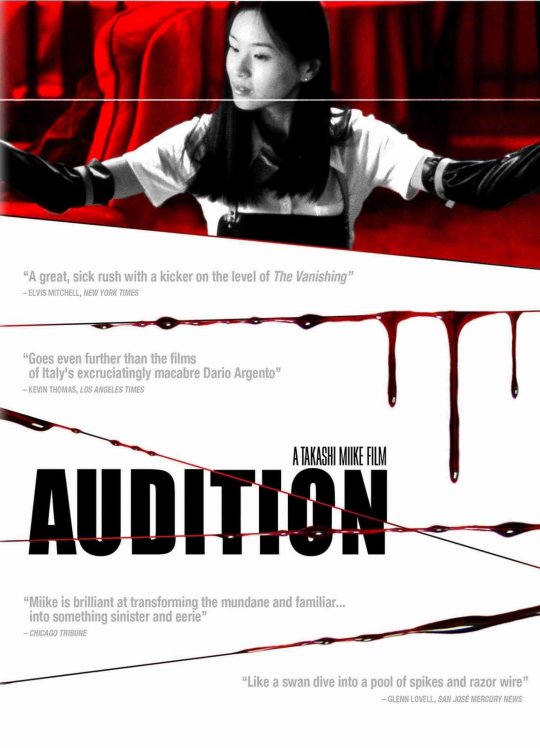
Audition (1999)
Greetings my dear followers, and welcome to today's service at the Cult Tent Revival! Today we have on offering a movie who's reputation precedes it. Please brace yourselves for the godmother of torture porn ... Audition.
The Message
When salary man Aoyoma loses his wife he is heart broken. As the years pass his son matures and begins to feel bad for his lonely father. Aoyomas son urges his father to move on and to find love. Spurred by this endorsement Aoyoma shares his lady troubles with close friends, one of whom comes up with a master plan. They will hold a film audition, under the presupposition that there is a major role in an upcoming move to play a wife, many eligible women will come forward and Aoyoma will have his pick of the candidates. When the time comes they will announce that the film lost it's financial backers and Aoyoma will be left with a long list of bachelorettes.
Against his better judgment a lonely Aoyoma agrees to the charade. Many quirky and interesting young ladies from the area show up for interviews and auditions, but the wistful and brooding Asami is the one who catches Aoyomas eye. Though hesitant to act on his deceit Aoyoma eventually caves and begins to see Asami. It is revealed that she is the survivor of quite a bit of loss and abuse, and a former ballerina. Aoyoma seems not to put a whole lot of thought into this and seduces Asami. The stricken Asami asks Aoyoma to promise her that he will love no one else but her. He agrees not making any caveats for his family or deceased relative.
After the relationship is consummated Asami disappears and thus Aoyoma begins a desperate hunt to find his new girlfriend. However, many of the leads Aoyoma trails down using the information he gathered from the audition lead nowhere and the few that do turn up are quite disturbing. Eventually upon returning home Aoyoma sits down and enjoys a nice glass of bourbon, only to find Asami had beat him home and drugged his glass.
Fact and Fiction blur as we are treated to a smorgasbord of graphic horror. Asami beheading her old dancing instructor, feeding vomit to a tortured soul she has been keeping in an old sack, and of course the brutal and horrific torture of Aoyomi himself. Asami is eventually discovered in the midst of brutalizing Aoyomi by his son and suffers a fall. She breaks her neck but not before she repeats her vows to the mutilated Aoyomi and our film ends.
Let's get to the Benediction
Best Aspect: Dead Meat Cute
if you were to remove some of the brutal imagery from the second half of the film, and were to ignore the downright misogyny of a plan that includes a faux audition to lure women into a relationship you would wind up with the formula for a pretty basic rom com. In fact, without the eery score it could be said that a large part of Audition actually plays like a by the numbers love story. It is this morbid inverstion of these roles that actually serves the horror of this movie far more than it's torture porn and graphic imagery. Many people have shyed away from this movie due to it's reputation for fear that it is nothing more than graphic and shocking violence, but this is far from the case. Audition is a good movie, and it's hero and villain are quite sympathetic.
Worst Aspect: It Was All a Dream
There is much debate online regarding what was "real" in this film. Things begin happening where logic is thrown out of the window. I was personally tempted to fall back on the traditional Japanese ghost story themes of wronged women, of which Asami is one, and accept that something supernatural was going on. This was unfortunately negated by the films own director confirming that everything we are seeing on screen is real, just in a jumbled way due to the protagonist's drug induced state. That still doesn't explain some things and it really feels like Takashi Miikie is channeling his inner David Lynch here. The debate rages on even after Miike's revelation, because if you are trying to give this film a logical timeline we are confronted with many logical errors that a drug trip just can't explain away. The Best you can do is just sit back and accept what you are seeing. Enjoy the ride, but don't try to create a timeline or you will have a bad time.
Best and Worst Character: Predators and Prey
Asami and Aoyomi share the first and last place for best and worst character. Asami is a victim, she is taking power back, and she is clearly an intriquing black widow of sorts. Once she dons her torture gear the film is all in on her. We want to see this poor child take the power back into her hands, but she is also misdirected and though Aoyomi is not innocent she is definitely going to irredeemable levels of mistreatment to make her point. She's very unsympathetic and it really downplays Aoyomis wrong doings to the point that many will disagree with me that he deserved any of this.
Aoyomi is often interpreted as this innocent widower. His loss does make him sympathetic. He was genuinely looking for a connection and not just for sex, though if my interpretation of the "dream sequence" is correct, he did cave and have sex with a few of the auditioners besides Asami. That is however left up to your personal interpretation. He was still in the wrong however for his lies. He and his friend intentionally crafted a scenario that was inteded to trap young women so that he could choose from them. In a non horror movie this may have been a quirky object for a meet cute, but in both Audition and real life, it's fucking creepy and wrong. Asami saw this, and so should the audience. Of course I don't think that Aoyomi was evil, just misquided. He did however place himself in a position to do harm and Asami is an avenging Demon to punish the wicked.
What makes this film work however is this ambiguity. This is not a story of Good vs Evil, it's a story of Good and Evil. They both exist within and without one another and Audition is an important reminder of how easily our experiences and our loss can blind us to the moral implications of our actions.
Best Kill: Piano Wire
Within the dream sequence Asami is shown to approach her old dance instructor while he is playing on the Piano. She produces her weapon of choice, a piano wire, and the dance instructor gladly accepts his fate. We are greeted with flashes of several poignant images as she saws back and forth into the flesh of his neck before fully decapitating him, and his severed head lands with a satisfying and bloody thud onto the ground.
Most WTF Moment: In The Dog House
We are treated to an incredibly visceral scenario at one point in the film where Asami feeds her own vomit to a victim. Earlier on in the movie there is a writhing sack in Asami's home that we are left to ponder the contents of. Of course, we presume it is something living. In the dream sequence in the third act the bag is unbound and a man with several missing extremities slithers out. We can hear Asami of camera retching. She makes her way into focus and she produces a silver dog dish full of ... well, you guessed it. She places it before her pet, and the mutilated man gladly accepts his dinner.
Summary
I have stayed away from Audition for a very long time. I remember hearing rumours, though they may be just that, around the time that The Devil's Rejects was released, that there was only one movie that Rob Zombie was too afraid to watch a second time. That movie was Audition. That was enough of a negative endorsement for me. I am a fan of horror, of dread, of fear, but I think that in the pursuit of those experiences repulsion and gore can be excellent servants. but there are many films that think that disgust and gore are enough to inspire fear and that is just not the case. I was afraid that Audition was one of those movies. It is revolting, it is upsetting, and vile. But it is also terrifying and phantasmagoric. Audition walks the line of torture porn expertly and produces something better than a lazy gross out feature. It has layers, it has pathos, and more importantly it allows us to imagine our monsters more complexly.
Overall Grade: B
10 notes
·
View notes
Note
John Gaskell
Why I like them: Oh, John. One of many, many Holby characters from the last few years with massively wasted potential. His early episodes showed so much promise, and it helped that he was played by the incredible Paul McGann. He was, essentially, a darker version of Henrik, and on that level, he really worked (again, particularly at the start of the storyline, but we saw glimpses of it start coming back towards the end too).
The scene that defined John Gaskell as a character, to me, is in Report To The Mirror, when the staff break into his lab only to find he's abandoned it, having left Lana (the coma patient he was trying to help because she was the daughter of a woman who'd helped him when he was trafficked) cut open on the table.
His early episodes seemed to imply he genuinely wanted to do good for people - especially for Lana, but not only (we know he only found out about Lana and tried to help her after his seeming success with Laszlo) - but was very, very ruthless and unethical in how he was going about it, and I always found that bizarre relationship with morality incredibly fascinating (I just wish it had been explored more).
Why I don't: On a character level: I mean, he. He murdered people. That's kind of a big deal. 😂
On a writing level, I despise how he was just written as a caricature of "those scary crazy people". Like 90% of the "ooh isn't John being creepy and evil" scenes were just him being visibly severely mentally ill, only about 10% was actually him doing bad things.
Favourite episode: Anything written by Andy Bayliss with him in it, because Bayliss was like the only writer who actually seemed to care about John as a character and want to flesh him out into a more complicated character rather than just an ableist stereotype. So basically, One Man And His God or Report To The Mirror would probably be my favourite John episodes.
I have complicated feelings about Stains - Patrick Homes was really leaning into the "scary crazy person" stuff with that one, but it does give some really interesting insight into John's character, I think. And Paul McGann's performance was brilliant. So I'd probably have to count that too.
Favourite season: Series 19, even though he was only in it for 4 episodes. Just because the morally ambiguous John of his early eps was so much more interesting than the bad-horror-movie-villain version we got later on.
Favourite line: I mean, "I won't let you go" is iconic, so there's that.
I also like his speech about good and evil to Nicky in We Need To Talk About Fredrik, because it shows how much more interesting the version of John who had a really bizarre sense of morality was than the version of John who just did evil stuff to be evil. I can’t be bothered to go and watch the scene again to type the exact quote out though.
Favourite outfit: I liked the outfit he wore in Stains. Dark blue suit, lighter blue shirt, red tie. His outfit in No Matter Where You Go There You Are part 2 wasn't too shabby either.
OTP: Johnrik, obviously. I really can't see him with anyone other than Henrik, except maybe with Henrik + the rest of the Cryptid Squad in a polyam situation.
BroTP: Him and David! They really seemed to be quite close from what we saw of them in Group Animal part 1, and part of why I wish we'd seen more of David is so we could've seen more of his friendship with John.
Headcanon: I keep forgetting this one is even a headcanon, but: John struggled with psychotic symptoms for much of his life, not just when we start seeing him show them in canon (which is only in his last few episodes).
Also, he listens to My Chemical Romance.
Unpopular opinion: It will never not disturb me how the fandom seemed to hate John for being mentally ill more than they hated him for being a fucking murderer. Like, seriously. Why the hell is it that whenever the fandom wanted to insult him, they always went to talking about how "crazy" and "insane" he was? He literally killed people and you still can't think of a better insult?
A wish: I just wish he'd been written better. Mostly, he just ended up being Fredrik if Fredrik was a caricature of mentally ill people. Also, I wish he'd (or at least his hallucination version) gotten to kiss Henrik in Report To The Mirror.
An oh-god-please-don't-ever-happen: I really hope the show doesn't end without him ever being mentioned again. ESPECIALLY if Henrik and Russ are indeed going to end up together, they had better give John some acknowledgement as Henrik's first male love interest and the character responsible for making Henrik bi onscreen in the first place. If John hadn't existed Henrik/Russ would almost certainly never have happened, least they can do is mention him again and explicitly, irrefutably acknowledge that Henrik was in love with him.
5 words to best describe them: Once again, he wasn't developed enough as a character for me to have any words to describe him... :/
My nickname for them: I don't really have one, although I feel like I should.
1 note
·
View note
Text
I’ve got a theory...that it’s a Vampire
So before I say anything else, I just wanna say, wow...I have so many followers. Thank you all so much! But also, who would have thought that, in the year of our lord 2020 the most popular blog I’ve had would be me reviewing Twilight. The fandom is still very much alive and well! But damn, so many of you. I love you all! So Bella is supposed to give her theories, but she begs for another question to be answered first. She wants to know how he found here which is....her scent. Charming. Then she is aghast at his theory that her brain is on a different frequency than everyone else’s and that’s why he cannot hear her thoughts. Edward pretty much sums up my thoughts on this with this. “I hear voices in my mind and you’re worried that you’re the freak?” All that being said, again, here we have this mystery about Bella, this aspect of her that could have been built upon and explored. After all, as of yet, the villains have yet to be introduced, it seems like this is set up to be more of a self contained story and yet.... sigh. This is pretty much dropped. So after a bit of these, Edward demands to hear her latest theory which is ....vampire. Yes, after 124 pages Bella drops the “V” word and then explains to Edward all about Jacob and how she flirted with poor Jacob to get the information about the “legends” and she came to the vampire conclusion....and then decided she didn’t care . Edward is, honestly kind of appalled that she doesn’t care if he is a murderous little critter. Like....bless him, he knows that he is trash sometimes and is very concerned when other’s don’t see it. Side note: Edward also feels sorry for Jacob, because , bless , the poor boy did not deserve this. We get the “How long have you been seventeen line” and I honestly love how Edward is just like “Yea....done that for a while “ And then they go through the myths and facts of vampires. They don’t burn in the sun, no sleeping in coffins. And he doesn’t sleep, at all, ever. In fact he seems wistful about the idea . Kinda makes you feel sorry for him for a minute. Which ...i go back and forth with Edward, tbh. Sometimes I love him..other times I wanna throttle him. It’s a tough road. So then he, of course, brings up the fact that, you know....vampires have very very special diets. Bella tells him that Jacob mentioned his family doesn’t nom nom on people. Edward points out that, yes, they do try to avoid people but they are still, you know, dangerous. of course, Bella has the self preservation of a capybara ...hell, at least they can hide in water, Bella just....dives right into danger every time. She’s like my cat that tries to jump on the dog that chases her and nips at her on the daily. no self preservation, nada. Course, Bella at least is going after a hot vampire. My cat is just...not right. So Edward explains he doesn’t want to be a monster, the Cullen’s “vegetarian” diet, and the fact that sometimes it’s harder than others to keep from biting humans. And oh, Bella, honey, he might have told you he wanted to kill you but, you have NO idea how close you came to being Lunch. Bella clues Edward into the fact that she’s noticed how his eyes change when he’s hungry. Which he finds amusing, but then...then he explains how it “makes him nervous” to be away from her. Now, it kinda makes sense from Edwards point of view, because this girl is...well she’s kinda taken over his brain. Her smell drives him nuts and yet he feels protective of her because she NEARLY DIES EVERY FIVE SECONDS. as he points out when he sees the scrapes on her hands. Again, this could have been a really neat plot, him being destined to be the one to either save her or kill her...but no....not that. Because, instead, we get Bella also being anxious when she doesn’t see him because.... teenage hormones? Idk...i get being upset when you don’t see your crush but the anxiety bit is kinda over the top, especially when she starts FUCKING CRYING when he points out that it’s one thing for him to be fixated on her and another for him to drag her into it. *sighs* Maybe this is a me thing, I dunno, but crying makes...no sense to be at this part. If it were supposed to be the rush of all the night’s events catching up to her...sure, but over this? This girl was completely unfazed 5 minutes after being rescued from a possible gang rape, but is crying over this? I don’t get it, I really don’t. I know I’m basically the worst at reading emotions, and I really don’t understand people a lot of the time but this...... seriously, if anyone has any idea on how her brain works...drop me a line? Cause I’m...really at a loss for understanding this part. Like maybe it’s because I’m a #dead-inside millennial, or maybeI’m a robot , but the emotional trainwreck that is Bella.....yikes. Edward apologies for making Bella have an random crying spell, and then ask her what she was thinking when she was nearly attacked-cause, you know, bringing up trauma is a great way to make someone feel better/s. Like, come on Edward, you’ve been alive for a long ass time, and yet you really suck at people. Apparently Bella thought about trying to fight and scream because she....falls down alot when running. Edward says he’s fighting fate trying to keep her alive and i’m just like???? “Dude...compassion??? She almost ...fucking hell.’ I am a bit frustrated with these children. Edward promises to be in school tomorrow and then ask Bella to promise not to go into the woods alone because ‘he’s not always the most dangerous thing out there.” Bella...you’ve been nothing but curious this whole time, but when he says “Let’s just leave it at that.” you have no questions? None? You’ve had it confirmed vampires are real and one is telling you there is worst stuff out there and you just....let it go? Like I get we’re setting things up for a sequel but...... come on, it’s a bit lazy for her not to prod a bit. Also, does this mean Edward was stalking her when she went into the woods that morning to? Jesus... He tells her to sleep well and then we get a bit on how...nice his breath smells. Which, i know, it’s all part of his apex predator self to draw people in but it’s still a weird thing to read about. She gets inside, takes a shower and realizes she’s freezing and begins shaking and trembling. she talks about her mind trying to suppress things and, for a brief minute, I think she’s actually going to have a ...reaction to everything that happened. Now, mind you, I don’t want her to be a shrinking violet, but her emotional responses are so ...over the place. She cries when Edward isn’t around, or when he points out he’s dangerous... but when she is put in actual danger, it rolls off of her. Gotta say it confuses me but...what do i know? I can watch horror movies till kingdom come, ready mystery novels, see medical gore and autopsy with no problem but I cry every damn time a pet dies in a movie...or music video. (I’m looking at you”Happier” by Bastille) So she’s not freaking out over the days evens, no, instead we’ve getting one of the most famous (and sometimes infamous) lines from the series. “About three things I was absolutely positive. First, Edward was a vampire. Second, there was a part of him-and I didn’t know how potent that part might be-that thirsted for my blood. And third, I was unconditionally and irrevocably in love with him.” Imma...just need a sec to unpack this here. Obviously we know he’s a vampire and it’s pretty obvious he wants to eat her (and not in the fun way) but the last bit.... In love with him...oof. I know teen love comes on fast and hard but this...you’ve only had a few actual conversations with him, and even fewer have been him not being a douche. Do I think she’s in LUST with him? Definitely. IS she in awe of him saving her life all the time? Of course. Intrigued because...vampire? Oh hell yea. But...you’re not in love with him Bella. Do I think she is later? Of course. But at this moment, I think it’s way more infatuation than love. She knows very little about him, in fact, with the exception of the vampire bit, I know more about a stranger from their facebook page than what she knows about him in this moment. Edward has stalked Bella enough that he knows everything about her. And while that brings up a whole fuck ton of other issues, at least it means he knows enough about her to have genuine feelings (as creepy as his behavior may be) But Bella, you’re not in love...not yet. Alright guys, i know this one was a bit more ranty then some of my other’s and this may turn some people off , but i said from the start I was gonna be honest about the good, the bad, and my feelings on it. I don’t care if people disagree, in fact, I welcome discussion. If you wanna message me and talk about certain bits, go for it! Just, make it clear if it’s a question/conversation you wanna have in private or something you’re cool with me sharing on the blog to futher discussion. Alright guys, love you all and , until next time, Stay safe!
#twilight#stephanie meyer#twilight reread 2020#edward cullen#Bella Swan#twilight reread#Yes the blog title is a buffy reference
19 notes
·
View notes
Text
1x08 - Vexed
Original Air Date: November 7, 2010
Written by: Michelle Lovretta
Directed by: John Fawcett
Okay, so. Vexed.
This is the original pilot. I don’t think they necessarily presented it as the first episode chronologically—more like, this is what you can expect from our show. Showcase picked it up and it went to series. Vexed became episode 1x08. You can find more info about it in this interview with Michelle Lovretta and Jay Firestone.
Anyway, this episode was shot earlier than the rest, and you can tell. Makeup and styling is different, and they hadn’t quite settled on the tone they eventually went with. As such, this episode is a bit grittier than normal. I find it interesting both for its different tone and for the fact that many of the decisions they made for the episode were made in the interest of selling the concept to Showcase.
This fucking article is great and is a much better review of this episode and why it’s so god damn good than my shit below. It also provides an extremely detailed look into...exactly what I just described above. All of the behind-the-scenes production stuff. Check it out.
The premise: Bo finds a lead on someone who might know about her mother--a falsely accused death row inmate named Lou Ann. Bo vows to prove her innocence in exchange for answers, but her quest leads her into contact with a vicious Dark Fae named Vex.
I do wonder if they wrote this episode without really knowing where it was going to fit into the first season, assuming they had an outline. It works as a standalone and in some ways it feels a little disjointed from what came before in episode 1x07, right from the beginning. Dyson coming right out and saying something so blunt as, “She’s never gonna love you,” feels a bit off to me. But then again, all the characters in this episode are a bit “off,” which is understandable. This episode is like…the prototype. The beta.
“No offense to my own kind, but humans are a little pedestrian now.” *awkwardly laughs* Right... “your kind”…haha you’re enslaved. Lauren are you okay.
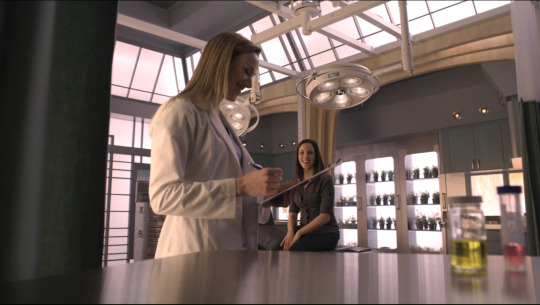
“Once you go Fae you never go back, huh?”
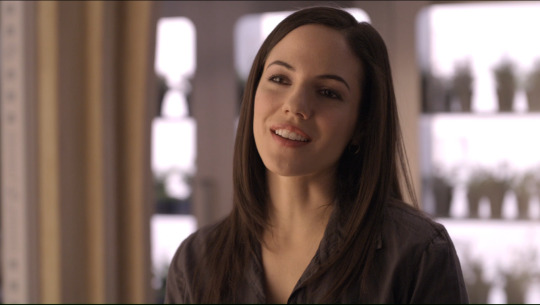
“So I hear.”
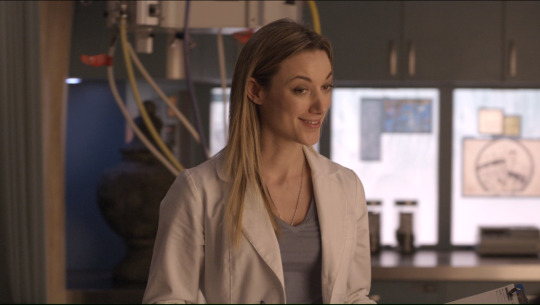
Me:

Bo feels a little bit more aggressive to me in this episode, like when Siegfried mentions her mother and she wigs out. It’s her normal desperation plus a bit of added homicidal urges. She’s a slightly grittier Bo.
As we can observe from the opening sex scene between Bo and Dyson, this episode is a bit more sexually explicit than we’re used to. This, I am not super a fan of on a personal level. However, the episode is also more violent than usual and incorporates horror elements. This, I am super a fan of because that’s kind of my shit, and it’s something I wish they would have leaned a little bit more into in the rest of the series.

There is nothing I don’t love about this scene. The creepy opera music that sets the stage, the gourmet meal prep (those gourmet meals always end in murder).


(Am I the only one who loves this random little detail they plopped into the background?)
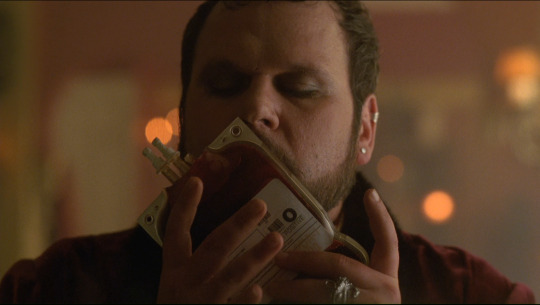
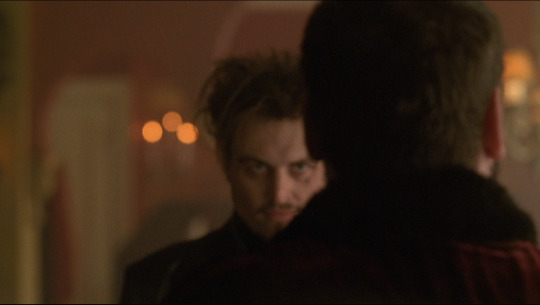
Vex’s entrance—not overly dramatic, just, boop, there he is.
The tense build-up as we’re drawn to the knife, not sure where it’s gonna go—


--oh, oop, there it goes.
We know what’s going to happen now, but we build up to it, agonizingly, anyway. Surely we’re not actually going to sit here and watch as he shoves his hand into the disposal and then keep watching as he turns it on and it grinds his hand up. Oh, but we are.
Some scenes have a way of sticking with ya.
So I guess even the Lost Girl universe isn’t all camp and games. People are still people. Especially when they’re ancient as fuck and have all that time to stew in the cesspool of their fucked up emotional and psychological issues. So divorced are they from the concept of mortality, growing up and growing old, that their maturity level laps itself and becomes immaturity—they tend to to behave like children.

Not all Dark Fae are curmudgeonly, innocuous old grandpas who own restaurants or absolute Queens like the Morrigan. Some of them are like Vex. And just like, fuckin murder people—and each other. Vex’s world is different than Bo’s world. Vex lives in a world where violence is mundane. Empathy is nonexistent and pointless anyhow. Sometimes I wonder if immortal characters are drawn to violence and death because it’s as close as they can get to experiencing a sort of vicarious mortality.
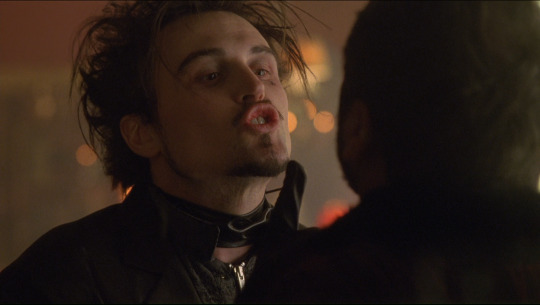
I love Vex’s character throughout the series—up to a certain point—but I love him best in this, his original episode. In later episodes, Vex is portrayed as a sort of morally ambiguous anti-hero, or anti-villain, whichever you prefer. I have mixed feelings on how well the transition from villain to anti-hero is handled. The farther along you get in the series, the more he becomes reduced to a shell of his former self, purely comic relief, and just…sucks.
But in 1x08, Vex is a villain. Straight up. The things that he does are horrifying and the show does not bother trying to get you to empathize with him. And to be clear, this does not mean that he is not a multi-dimensional character, that he isn’t worthy of empathy, or that he is pure evil. What it does mean is the show does something I wish more shows would do. It creates a genuinely threatening and reprehensible villain that is both worthy of your analysis, even your stanning (I stan), and yet whose actions are still inexcusable.
In that interest, let’s talk about him. At this point, his most defining characteristic, the simplest way we can begin to understand his motives, is that he utterly lacks empathy. Vex is the kind of person who would puppeteer a woman and force her to drown her own children.
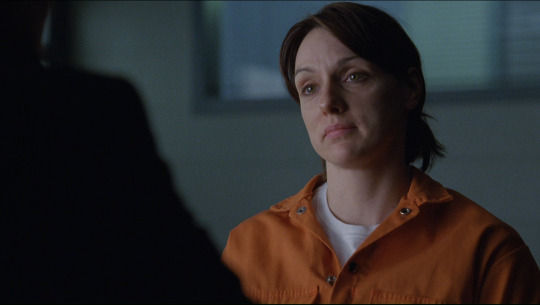
He is ordered to kill this woman’s family as punishment for betraying the Dark Fae’s rules. And in this episode, Vex is shown to be someone who rigidly follows the Dark Fae’s orders without question, and without any particular investment in them either. But he doesn’t just kill the kids—he uses his powers to force the mother to do it. To drown them. For no real reason other than his own amusement. That’s another level of sadistic. For a less intense example, in his introduction scene, he gruesomely tortures Siegfried before killing him. Just for funsies. (Well, okay, and to get information.) Vex lacks empathy, clearly, and may scan as a sociopath, but he’s not a stoic one. He gets enjoyment out of tormenting his victims.
Is this the kind of guy the writers are going to try to later convince us is a harmless comic relief mascot? Surely n—
Yes. Yes he is.
I am not at all opposed to the idea of Vex slowly becoming a morally ambiguous anti-villain, even a member of the gang. In fact, I think that premise is interesting as hell. But what I feel like happens later is that the show kind of forgets that Vex did all this horrible shit in the past. Kinda brushes it under the rug. Not only does this make it a lot harder for me to get behind him becoming one of the gang, it also does the character himself a great disservice. I’ll probably get into this more once Vex starts showing up more frequently, and why I feel the writers mishandle him.
To be clear, in spite of how sadistic he is, Vex is not a malicious person. He doesn’t have any enmity for the people he’s ordered to kill. He’s not angry, not hateful, not spiteful. He just doesn’t really care. He’s almost a kind of nihilist. None of it really matters. Somebody who thinks like that would have a fairly breezy time killing people.
Because I like when in-universe politics make things complicated, I like that the in-universe politics of the Light and Dark Fae makes things complicated. Bo wants to free Lou Ann, and she wants the Light Fae’s help, but they can’t help her because it would mean basically declaring war on the Dark Fae. MAJOR no-no. Likewise, they can’t go after Vex because all of his actions are sanctioned by the Dark Fae’s government. Bo’s unalignment gives her freedom, but it’s not without its downsides. She has no influence and no resources when things get too big for her to handle.
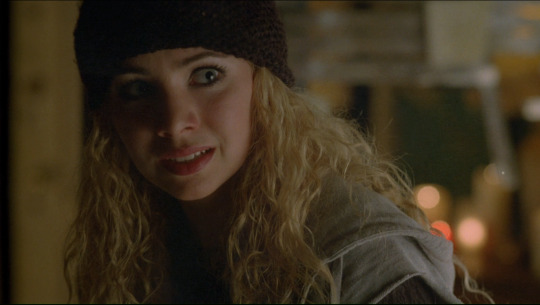
“Smells like fried bitch.” An icon. If I remember correctly from one of the behind-the-scenes features, they brainstormed and tested out a bunch of different one-liners to use for this moment, until Ksenia Solo ad-libbed this.
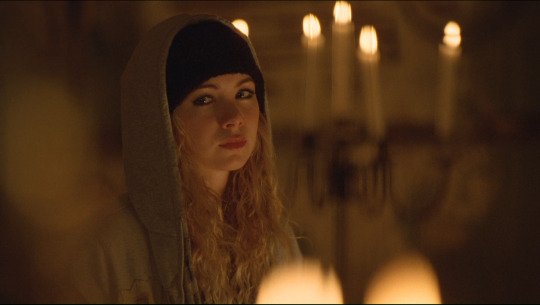
Lol. Kenzi is just so done with Bo and Dyson’s drama.
Lou Ann, the Fae woman who is on death row for killing her kids, obviously strikes a nerve with Bo.

It’s kinda weird, because when we first meet her, Bo’s main motivation is that she wants to be able to live her life without being forced to kill others and stay on the run to do so. Those problems kinda get solved in the first episode.
Since then, her motivation has been to live her life without these big mysterious Fae governments telling her what to do. In the first episode, Bo, like Lou Ann, says that she chooses humans. Bo was raised human and wants a normal human life, or as normal as she can get. At the same time, most of the other characters on the show, including her friends, spend a lot of time trying to convince her to embrace her Fae identity and a Fae lifestyle, because it’s “who she is” and she has no choice but to embrace that. “Choice” is a keyword that gets thrown around a lot in this show. But what is the show really trying to say about it? There’s some kind of nature vs. nurture conflict going on here, and I don’t feel like either Bo or the show itself has really decided on which side of the line they fall. On another note, this show has huge Fuck the System vibes. Which I appreciate. We stan an icon who chooses to reject a static, repressive, harmful system even at great personal cost.
A few episodes ago, Bo and Lauren went on a mission together and cemented their bond of trust. In this scene, Lauren breaks that trust.

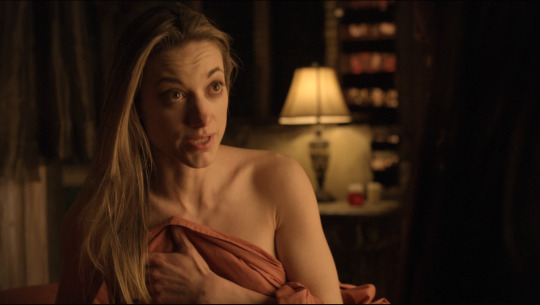
She sleeps with Bo to distract her from going after Vex, under the pretense that it is simply the culmination of them both being attracted to one another. The next morning, it doesn’t take long for Bo to figure this out. She is appropriately hurt. She has feelings for Lauren, there was an intimacy there, and she trusted her in a way that she doesn’t normally trust other people, because of her past. Lauren took advantage of her feelings and used her. Whether Lauren wanted to do it or not, whether she had any way of refusing, isn’t relevant in this moment; it was cruel regardless.
But what does Lauren say?
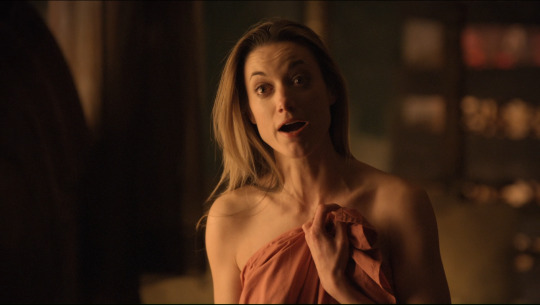
“I haven’t done anything wrong.”
Oop. There it is. There’s the Lauren I remember.
She hasn’t done anything wrong, y’all. Well, I’ll be damned. Lauren never did anything wrong ever in her life. *Lauren did nothing wrong meme*
The way Lauren says this line, with so much conviction, makes me feel like she genuinely believes it. She believes that she did nothing wrong. She is legitimately deluded about what just happened.
This is only the first in what I remember to be a very long string of instances where Lauren pushes blame onto others and denies any culpability in her shitty actions. At least, in this case, Bo isn’t buying it.
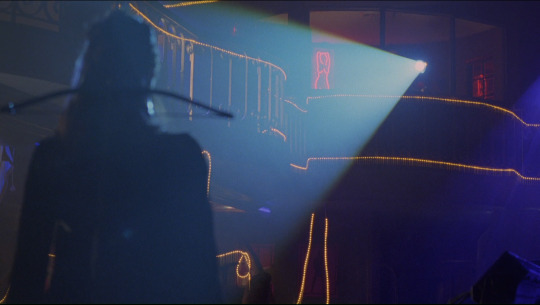
Waiting for Bo in the most extra-ass, goth, flamboyant setup possible is exactly the kind of quality villainy I expect from Vex.
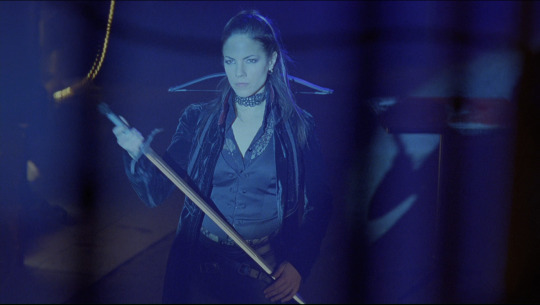
It’s criminal that Bo never gets to use this awesome sword.
And…I love that Vex just gets to walk out of there, laughing. Because the system. And he’s not even really evil. He’s just a sadistic asshole. With a job. It’s. *chef’s kiss*
9 notes
·
View notes
Text
Psycho Analysis: Pennywise (2010s duology)
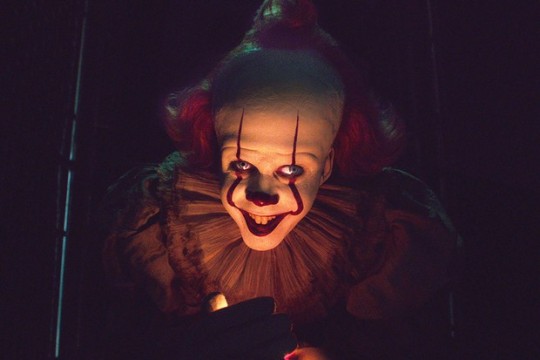
(WARNING! This analysis contains SPOILERS!)
27 years after the miniseries adaptation, a new adaptation of Stephen King’s It came along, and with it, a new Pennywise the Dancing Clown. As hit or miss as the miniseries was, pretty much everyone is in agreement that Tim Curry’s fantastic, hilarious performance is the one bright spot of that version, meaning anyone who would be playing Pennywise in the new version would have some pretty big clown shoes to fill.
Thankfully new Pennywise Bill Skarsgard is 6’4” tall, a size that is most certainly big enough to fill any size clown shoes his predecessor may have left. His performance is a fantastic new take on an iconic character, and while it certainly does have weaker elements to it (as Curry’s did), there’s still more to love than there is to hate.
Actor: Bill Skarsgard portrays Pennywise this time, and while he is quite obviously no Tim Curry, he most definitely is a Bill Skarsgard. I love everything he brings to this role: his intimidating height, his creepy voice, that weird thing he does with his eyes… in the same manner in which Curry brought his Pennywise to life with the voice and mannerisms of a charming kid’s show host, Skarsgard brings his Pennywise to life with the mannerisms of an alien beast that can only just barely put forth a front of normalcy as it hunts its prey, and because of this he manages to make Pennywise utterly terrifying.
Motivation/Goals: Pennywise’s motivation is the same as it always is: he comes around every 27 years to eat children, opting to spice them up with a healthy dose of fear before going in for the kill. Frankly, in this regard he is really no different from the Tim Curry version or the book version, though he does opt to do things in a more overtly sinister manner than the other two incarnations, and when it comes time for him to harass the adult Losers in Chapter Two, while he does opt for some jokes here and there, he mostly remains creepy and disturbing the whole time.
Personality: This take on Pennywise is actually quite interesting, as compared to the Tim Curry one, this one is actually legitimately terrifying… to a fault. He is so utterly monstrous that a lot of the time it’s hard to believe he could ever sucker children in to being his victims, with Georgie’s death being a prime example – Pennywise is so absolutely creepy to the point of salivating over the thought of eating Georgie that the kid nearly runs before he gets within biting range. He’s pretty light on the jokes too, but frankly I don’t see that as a big minus; I like that this Pennywise is creepier and legitimately unnerving.
Final Fate: This is where the Skarsgard version truly has the Curry one beat; instead of turning into a giant, awful stop-motion spider, Skarsgard’s Pennywise turns into a giant clown drider and tries to kill the Losers. While he manages to get Eddie in the final confrontation, the remaining members all band together and… basically just insult him until he shrinks down and they can rip his heart out. When I said this has Curry’s beat, I never said it was perfect, after all. At the very least a green glow post death implies that Matarin was helping the gang, and Pennywise seems definitively dead in this continuity, so at least this goofy finale leads into a happy ending.
Best Scene: Much like Curry, Skarsgard has no shortage of fantastic scenes to pick from, with my personal favorite being when he unfolds from the fridge to attack Eddie in the first movie. However, objectively speaking, I think Skarsgard’s most definitive moment is his insane little jig he does to try and weird out Beverly, which went absolutely memetic after the film released. Of course, what the memes don’t tell you is when Beverly does not respond to his goofy dance, he peels back his face and shows her his deadlights, causing one of the most wonderful mood whiplashes I have ever seen in any film ever.
Honestly, I do find it kind of amusing the funnier Pennywise got a best moment where he was actually scary, while the scarier Pennywise got a best moment where he was actually pretty funny.
Best Quote: Unlike Curry, I don’t feel like Skarsgard was really a goldmine of quotes. Still, he gets some good bits in where they count, such as when he feigns hurt feelings at Bill for not thinking his scares are “real” enough. However, I think his taunting of Richie over his closeted gay desires, complete with a goofy little song, is his best bit for just how many lines it ends up crossing before finally landing on darkly hilarious:
“Did ya miss me, Richie? 'Cos I've missed you! No one wants to play with the clown anymore. Play a game with me, would ya? How about Street Fighter? Oh, yes, you like that one, don't you? Or maybe Truth or Dare? Oh, you wouldn't want anyone to pick Truth though, would you, Richie? You wouldn't want anyone to know what you're hiding. I know your secret! Your dirty little secret! Oh, I know your secret! Your DIRTY little secret! Shall I tell them, Richie?”
Final Thoughts & Score: Skarsgard’s take on Pennywise is a take I just love. I love the weird quirks and mannerisms Skarsgard brought to the table, such as the eye thing his Pennywise does or the weir contortions and gestures and faces. I also love just how menacing and disturbing his Pennywise is, something that I felt was especially lacking in Curry’s performance; while Curry was certainly funny and had superb line delivery, he just couldn’t muster up a single shiver from me the way Skarsgard’s take on Stephen King’s monster clown did.
So, of course, I give him a 10/10. It really helps Skarsgard didn’t have a finale half as bad as Curry’s Pennywise did, and he did manage to be genuinely amusing in Chapter 2, though certainly not to the extent Curry’s Pennywise was. He’s an enjoyable take that, while not as entertaining in persona and comedy, is definitely a fun watch in terms of horror and sheer sadistic glee. It’s sort of a Heath Ledger’s Joker to the Jack Nicholson Joker that Curry’s take was: two excellent, valid performances of the same character that are great for different reasons.
But here’s the thing: they aren’t perfect. Out of all of Stephen King’s villains, Pennywise is one of the ones that could easily be an 11 out of 10. He’s iconic, he’s entertaining, he’s a big figure in pop culture and has inspired numerous monster clowns and eldritch abominations since his inception… and yet, every time the character has been put to screen so far, there is just something missing, that secret essence that King tapped into in his book that managed to make Pennywise equal parts darkly comic and unrelentingly monstrous. As far as adaptations go, these facets of Pennywise have been split into two performances, and if we ever got them in one performance, we’d have the definitive Pennywise that I could safely say is one of the greatest cinematic villains ever.
For now, we’re at least fortunate to be stuck with two great, unique takes on It. Let’s see how they do him justice 27 years from now in the next adaptation.
29 notes
·
View notes
Text
The Handmaid's Tale: Unfit (3x08)
Um. Well, that happened. That certainly was... something.
Cons:
Can we talk for a second about the utterly clumsy way this show deals with race? It makes me cringe every time. For the most part, they try to pretend this is a totally post-racial society, but obviously they can't pull that off. And then they have some casual moment where Aunt Lydia tells some other aunts that a certain couple doesn't want a "handmaid of color," so clearly casual racism is not only present here, but also condoned by the elite. Because, duh. Gender politics cannot exist separate from racial politics. And yet this show is not willing to grapple with what that means.
Especially considering June, who is the Whitest of White Feminists in this episode, and honestly, throughout the whole show. Her plot armor is seriously becoming a problem for me. June and the other Handmaids are open and unsubtle in their shunning of Ofmatthew, because they are all furious with her for turning in the Martha who was helping June. What happened to the first season, when the rebellion was deep, deep in the shadows? Now the majority of the Handmaids are allowed to be insolent. And then June is even more insolent, right to Aunt Lydia's face. She seems to think that her usefulness as publicity in the hunt for Nichole will protect her, and... that seems to be true, for some reason. But why? June could be flogged, or she could be castrated, or any other number of horrible things that would be invisible to a camera. June's cocky self-assured attitude is only made more frustrating by the fact that she seems to be right about being weirdly untouchable.
There were some things in this episode that I liked as individual pieces, but I'm still frustrated with these aspects as I look at the episode as a whole. For example, the idea of Ofmatthew cracking under the strain of her public shaming, in conjunction with her fear for her pregnancy, is a totally reasonable avenue to explore. But since we haven't spent any real time getting to know Ofmatthew, it feels instead like this big blow-out at the end of the episode is all just a part of June's story, instead of the story of a woman with her own story to tell. There was potential here, and there were moments that came close to tapping in to that potential, but the reality fell short. There are also two other reasons that the ending of this episode, particularly Ofmatthew's death, annoys me, and they are the two reasons discussed in earlier paragraphs.
1) We're seriously going to end two episodes in a row with the death of a black woman while June looks on, untouched by the physical consequences of her own actions? Yeesh. 2) She's pregnant. I give the show props for making me gasp when Ofmatthew got shot, because even as I critique this episode, I will acknowledge that I have very much bought in to the universe they've created. I was shocked that a pregnant Handmaid would be shot, because... it's shocking, and despite that moment of adrenaline, it's ultimately a stupid call for the writers to have made. Aunt Lydia is not as valuable as a pregnant Handmaid. Part of the visceral horror of Season One was the idea that the Handmaids would be punished physically and psychologically, but they never had to fear for their lives, because their bodies were far too valuable. There was something twisted and creative in how the system worked to break these women without ever being able to directly threaten them with death. And now, apparently we're just shooting pregnant Handmaids in the grocery store? That actually really broke me out of the moment.
Let's turn to the flashbacks for a moment. This is another instance where as a stand-alone thing, I quite liked learning about Aunt Lydia's past. I get the sense from other reviews that I'm in the minority on this, but I think Ann Dowd is so talented, and the story worked for me on the level of examining the early symptoms of Gilead, even before things had started in earnest. But on a macro level, these flashbacks still bothered me for a couple of reasons. For one, the themes explored in the flashbacks did not connect with the story in the present-day, other than that both were centered around Lydia. The flash-backs are about a woman who genuinely wanted to help people, turned bitter in part by her evangelical beliefs and in part by her loneliness. The present-day story is about June turning more and more ruthless, and Ofmatthew losing her grip on her sanity. What am I meant to understand by learning a bit more about Lydia's former life? And that's the second problem, honestly - from just this episode, I might get a good-ish understanding of who Aunt Lydia is meant to be as a character, but if you combine these flashbacks with what we've seen of her character so far, it doesn't really track. Aunt Lydia's characterization is all over the place. She seems to slide on the scale of devotion to Gilead depending on what the plot needs from her at any given moment. For a long time, I've held out hope that we would come to some sort of emotional core for this character and finally understand what makes her tick. But if these flashbacks were meant to provide that clarity, in my opinion they failed.
Pros:
Let's talk about June. Because on the one hand, I'm annoyed about the plot armor, as discussed above. And it's tempting to be upset and frustrated by how unlikable June is becoming. Last week, I certainly felt that way. But I'm trying to take the long view. Turning June into something of a villain is... well, it's not a totally crap idea. Maybe the final consequence of the torture she's been through is that there is no coming back for her. Maybe she'll keep being cruel and single-handed, focused on saving Hannah and nothing else. Maybe she'll nod sagely as Handmaids hold guns on her, and maybe we'll be hearing more voice-overs indicating that June is not only willing to inflict suffering on others... she's starting to enjoy it. I can't really sense what the endgame would be here, short of killing June off and letting the story continue without her. But that might not be as crazy an idea as it first sounds. This universe that they've created has legs. There are so many stories to tell. I'd be okay with telling those stories in a world where June is no longer at the center of them. Maybe that's not where this is going. Maybe I'll have to eat my words and be frustrated in the next couple of episodes at the direction the show turns. But for now, the idea of villainous June is kind of interesting!
One thing this show always does well is showing the creepiness of Gilead through the ceremonies. We have the birthing ceremony that ends in tragedy, as another Handmaid's child is stillborn. And then we have the shaming ceremony. It might be ridiculous to me that June doesn't suffer harsher consequences, but I do like the way Aunt Lydia's role in this shaming ceremony echoes her past as a teacher. The Handmaids are her students, parroting her words and internalizing the harsh messages they are forced to repeat, again and again. It's chilling, and it's meant to be, and it's a good scene, even with the flaws in the larger setup.
As I said, Ofmatthew unraveling and breaking down was actually an interesting idea, in and of itself. The acting and the pacing in that final scene was truly superb. At least in the moment, when I wasn't questioning the larger writing decisions going on, I was totally gripped. I thought Aunt Lydia might be about to die. I even thought Ofmatthew might actually shoot June, although I wasn't thinking June would actually die from it. And then when the shots rang out and Ofmatthew dropped, I literally flinched. I wish this story-line had explored more of its potential, but I did think this high-intensity scene worked really well on its own.
And again, I did enjoy the flashbacks for their own sake. I think it's interesting that Lydia was turned towards a darker, more cynical path because of her attempts to find love again. I read in another review that it seemed stupid to make Lydia evil because she was rejected by a man, but that's not the way I read the moment at all. She breaks so many of the rules she had set for herself on that New Year's Eve. She drinks, and she lets herself be comfortable, and she indulges her desires. Suddenly, she realizes that she's slipped away from the righteous path, and she over-corrects in a big way. That's interesting to me, and I hope that we can get some more clarity on Aunt Lydia's characterization moving forward.
I also like all the hints of the changing world. It reminds me of some of the Season One flashbacks. We learn that Child Protective Services has been replaced with privatized organizations, ones that ask questions like "do they go to Church?" in order to determine if a home is fit for a child. We see how Lydia is uncomfortable and judgmental of Noelle's behavior, and at first it seems perfectly reasonable, because she is neglecting her child. But there's something more dangerous underneath that, as Lydia is judging not only Noelle's parenting style, but her wearing of makeup, and use of profanity, and relationships with men. It all bleeds together, so you can see the sinister creep of Gilead's power beginning in these moments.
So... yeah. This is a very long review, and unfortunately a lot of it is less than positive. There are elements that have promise, and I'm giving this show the benefit of the doubt, because I believe it deserves that. But I'm also starting to feel like the writers need to re-evaluate some aspects of the story, and figure out how they're going to keep moving forward with June as a protagonist.
6/10
#review#handmaid's tale#handmaid's tale review#the handmaid's tale#the handmaid's tale review#handmaids tale#handmaids tale review#the handmaids tale review#the handmaids tale
66 notes
·
View notes
Text
ok this could have been a fun essay if i had actually ever finished it or gone in depth with any of it or really Made it an essay rather than an opinion piece.
but it’s so old that that’s unlikely to happen at this point, and i did mean to post it eventually, so here it is, under a cut. it’s just sith triumvirate feelings.
i really enjoy the sort of ?not villain decay, i think that’s a different thing, but something in the same like, order of concepts? we get with sion after nihilus is introduced
like, sion is introduced with essentially a survival horror scenario where no one knows what the fuck is going on, as “a perversion of the dark side” more than e.g. malak ever was, “if that’s the new dark lord we should all be scared” kind of deal?
he’s got his own brand of horror, and remains genuinely very threatening in his own right even to the very end, but there’s pretty much always an option to try to talk him down or argue, in a way that there really isn’t with nihilus--he’s fucked up and threatening, yeah, very much not a Nice Person or probably remotely sympathetic to normal people, and also can be argued to fall into the “lovecraftian abomination sith lord” category himself (there’s a good post about that i don’t have the energy to go looking for right now). but relative to darth nihilus, and the amount of cosmic horror shit going on THERE, he’s still fundamentally just a guy with yeah some fucked up supernatural shit going on, but still fairly comprehensible human motivations. say what you will about the morality of things like “revenge” and “trying to prove yourself via murder” or his issues about traya, none of those are wildly outside what most people could plausibly come up with, it’s more about the methods and the supernatural shit being thrown in (i would say that how i interpreted his ideas about the force and his own existence is weird and, yeah, probably outside the realm of what most people would come up with, but it makes sense to me from a mental illness perspective, so, again, not inhuman by any means)
but nihilus? even visas’s take on nihilus (and i think there’s probably some argument to be had about whether that description is actually reflective of any kind of ideology on his part or if she’s reading what he showed her like that in an attempt to make some kind of sense of it and his Actual motivations are really no more than hunger), that sort of “the world is so ugly and chaotic it should be destroyed, and i am doing a good thing by wiping everything out completely” what i call omnicidal depression occasionally, is NOT within the purview of normal human motivation. in my experience even most of the people irl who talk about wanting the end of the world, if they really mean that, just mean because of humanity or have some misguided ideas equating capitalism to human nature. visas’s description of what was up with nihilus didn’t sound like that, it sounded like the issue was life itself. that’s already getting into “lovecraftian abomination” rather than “nasty human villain” territory, and the fact that he actually has the power to go through with it...
like, of course the sith are scary already, even with only the Standard Set of Force Powers, they’re supposed to be a real threat, and sion’s got his own weird creepy shit, but adding that kind of eldritch abomination factor just raises the stakes so much that by comparison the guy who’s literally too angry to die, whose main motivation is the destruction of the entire jedi order at all costs, who doesn’t care about power or glory or not getting hurt, only about Death and Carnage and Revenge, seems perfectly reasonable to like, argue with, even try to talk to your side
and the deleted scene where they fight, if it can be called that, reinforces that difference in power level/stakes even more--that even sion who wants to fight Everyone most of the time, and generally believes himself capable of it, doesn’t really want to start shit with nihilus unnecessarily, that even with all the drama and “jesus christ what the fuck how are you not dead” around him nihilus is a lot stronger, enough to not even bother with a lightsaber
and then also the fact that sion has multiple lines that are either obviously referential to vader or just identical to vader lines? i don’t think that’s a coincidence (would be difficult) or purely to point out that this is Star Wars Media™. star wars does have a Tendency to reuse lines, but i think there generally is some actual significance to which ones get copied where
like, that’s got to be deliberate, making him into some sort of parallel to vader--the terrifying Openly Sith face of the empire, but who eventually was redeemed, who chose his son in the end--and of course sion doesn’t get a redemption arc per se, and i’m honestly glad for it, but weren’t there a couple throwaway dialogue options where you could have the exile Want to go in that direction or something? i need to replay this
and even without that--i think even the comparison sets him up as more i guess human? i can’t words this right sorry, in contrast to nihilus, who is utterly beyond comprehension, beyond being reasoned with, for whom even the faintest suggestion of redemption would be impossible, even absurd--the tragic side of what the dark side can do to people, as much as the fear
where nihilus has no OT parallel imagery, he’s just his own thing
there really isn’t any point to this, no thesis or argument or anything, it’s just a feeling i had more than a year ago cleaned up a little bit
4 notes
·
View notes
Text
Okay Non-Spoiler Review
So I am gonna put this under a cut because it might get a bit long but yeah i’ll keep it spoiler-free and if you’ve been following my liveblogging of it i am gonna just re-iterate bits of old text posts during this so ye
So The Haunting of Hill House was fucking amazing. Let’s get this out of the way first though: If you come in looking for an adaptation of Shirley Jackson’s novel or the ‘63 film, you’re going to be disappointed. Or the ‘99 film, but if you want an adaptation of that, you’re a monster and may God have mercy on your soul.
Characters share names, very famous scenes are referenced, the opening line of the book is quoted almost verbatim and re-visited at the end with a twist like the film (although not the same twist but i shan’t spoil), and it involves psychic characters in a haunted house. That’s about it, though.
This story focuses on the Crain family, who were the spooky background story family in the OG, and completely changes their mythos as well. So the characters are all related, they live there as kids and don’t actually go back as adults until just about the end, and it’s dealing with their grief and trauma and dysfunction that drives them, not any kind of experiment in the supernatural.
No, what this show has much more in common with is Oculus. I know I’ve said this repeatedly but I can’t stress it enough. The Haunting of Hill House literally has more in common with Oculus than it does with the novel it takes inspiration from. Similar cinematography, similar style ghosts, same flipping between past and present, similar eldritch abomination disguised as inanimate thing villain fucking with perceptions of time and reality...The Haunting of Hill House really is more a re-imagining of Oculus than a re-imagining of The Haunting of Hill House.
Now that’s all just to address people’s expectations, though. Once again, if I had expected a re-imagining of Oculus, I wouldn’t have said no, because Oculus was the big dog’s biscuit. For those not in the know, it’s about a brother and sister whose parents went crazy when they were kids, their dad killed their mom, and then the little brother had to kill the dad in self-defense. He’s spent years in a mental hospital and chalked everything up to mental illness and an evil father, while his older sister is convinced the mirror they had just purchased was evil and drove their parents to do what they did. Zombie ghosts with glowing white eyes and mind-fuckery ensue. If you’re reading this after starting or even finishing THOHH, you may perhaps notice that sounds awfully familiar.
Oculus was actually an expansion of/improvement on a short film Mike Flanagan made, which you can find on youtube. I’d argue THOHH is an analogous expansion of/improvement on Oculus.
The thing with Oculus is it had problems. Because of the power of the mirror, basically from the moment they enter their old house until the end of the movie, the thing’s illusions are so strong that there is no way of knowing what’s really happening. Audiences complained that it’s hard to get invested in a plot when you’re not sure how much of the plot is actually happening or when it’s happening, in the past or present. Flashbacks and the present narrative blended together in very artistic and jarring ways, but some people found it too jarring, hard to keep track of, nonsensical. Additionally, things were a bit rushed, and there wasn’t enough room for Flanagan to really let some of his more complex concepts for the plot and the scares breathe.
Thankfully, in THOHH, Flanagan seems to have really actually taken those critiques to heart. There are characters largely unaffected by what’s going on, and the sequence of events never truly gets cluster-fucked. It’s a much more coherent narrative. In Oculus, a big complaint was things were too muddled to tell if the rug was actually being pulled out from under you and where the rug was to begin with and whether there was a rug in the first place. There is no fucking question in Hill House.
Additionally, the 10-episode set-up means that he can go absolutely wild with everything he wants to do, and it fucking shows.
In Oculus, one of the most disturbing scares was a brief flicker on the TV. A split instant that showed the adult sister, mouth open and dripping blood, dead and vacant stare in her eyes, for less than a second. On the TV the younger brother was watching as a child in the past. It was truly unnerving. Something similar happens when they pass the cameras at one point that they’re using to record the mirror, just showing creepy pictures of her face. But those are the only two really good easter egg background scares that could fit in that movie. There was much more right up in your face.
Not so in Hill House. Hidden ghosts and unsettling details are EVERYWHERE. Not even just the now-famous easter egg ghosts. There are also obvious ghosts in the background that seem like jump scares waiting to happen....that don’t. There are small details that change, people walking past in the background of a hallway silently, statues that turn their heads to face a character without anyone noticing it in-show. The tension is masterfully built. There are scenes that you don’t even fucking realize are scary until you see something later that completely re-contextualizes it.
It also expands on the driving concept behind Oculus, family trauma and the repeating cycle of mental illness, which wasn’t as well explored there as Flanagan clearly wanted to. But here? In all its 10 episode glory, with each child’s trauma and resulting psychological issues getting full spotlight for an hour?
It hits you hard. Flanagan’s concepts are fully realized. You get to intimately see what their childhoods have done to these characters, how history repeats itself (sometimes literally), how the ghosts-if you’ll pardon the pun-of the past drag the living of the present down. Not only that, he expands the themes he worked with in Oculus to include some downright Pet Sematary-style shit about loss, grief, and what meaning can be gleaned from death. It’s oppressively heavy, and the scares and the sadness interweave in beautiful ways. The end of one episode, which sees a maimed, anguished, silently screaming ghost standing by her own corpse, completely invisible to the assembled mourners, is both an absolutely haunting visual and an existential punch to the gut. A lot of the show is like that.
Of course this wouldn’t work if you weren’t invested in the people, but they managed to hit another home run on the characterization front. Every single character of any importance in this show is sympathetic to some degree, and even if you don’t like them, you understand why they are the way that they are. The actors are mainly relative unknowns, but i’ll be god damned if they don’t breathe life into these people. There’s also Carla Gugino who....you know. Is Carla fucking Gugino.
You can tell love and care has been put into this show. Small details almost always become important, I’m sure if I went back through with a fine-toothed comb for a second viewing, I would find a downright Edgar Wright level of foreshadowing in the earlier episodes.
There were some questions I think I still have, maybe they’d be cleared up with a second viewing, and I do want to watch this show again. I had some issues with the ending which I won’t get into here, and the show absolutely isn’t above a jump scare or six. They’re never cheap though, either coming at the end of a truly tense scene or so insanely unconventional and out-of-left-field (Anyone who’s seen Episode 8 knows what i’m talking about) that it’s noteworthy in and of itself.
Overall, it plays out like a very intense and emotionally effective family drama about trauma, grief, sickness, death, dysfunction, and love with heavy horror elements. You’ll go half an episode without any horror sometimes, making it all the more jarring when it does rear its zombified, dead-white eyed head again. This isn’t to say that the tone isn’t cohesive, like i said before, it absolutely makes it mesh together.
And yes, I did say love up there. I want to pause for a moment to tell you that all hope is not lost in this show. There are genuine moments of humor, heartwarming, and love. Yes, most of them are at best bittersweet and at worst setting you up for a cold, black sucker-punch to the heart, but it’s not all darkness and fear and death. This show has heart.
I honestly can’t say enough good things about The Haunting of Hill House. The family dynamic was realistic as hell, the characters were complex, the scares and tension were masterfully executed, the themes were intelligent, the cinematography beautiful, I cannot recommend this show enough to anyone with even a passing interest in horror.
34 notes
·
View notes
Text
Misconceptions about Breaking bad ~ my theory (Spoilers!)
So I’ve just finished watching Breaking Bad. All seasons. I really loved the show. It was well written, well directed, well thought in every details, very well played with such talented actors. It is a masterpiece. Clearly, it was a show that had been thought of and worked on for a while to be perfect (like no plot holes, no OOC actions, no wasted moments, no pointless moves, no useless lines, etc.). Besides, this show had everything: badass action, fighting scenes, tension, drama (big time), humor sometimes (not often) and emotions (a lot).
However, I think there is a HUGE misunderstanding to what this show is about and an ENORMOUS misconception of why it’s so good and really likeable.
A lot of people I have met IRL, or read online, really loved this show as well. That’s not a surprise. As I’ve said, this show was really good for a lot of reasons and I will never deny that.
But as I was reading them/talking to them IRL, I’ve realised something. They loved Breaking Bad because they loved the story and the character of Walter White. They loved the story of an american middle aged white man, with a normal life, a traditional family and a boring job, becoming this super extra badass who ends up building and controlling a meth empire. Usually, they particularly loved season 3-4 when Walt is supposedly at its greatest moments. They loved Walter White and what he has become: a badass, a smart ass meth dealer, a dominating boss, a good provider for his family... a real man. They loved him as a hero. They loved him as a protagonist who should succeed and get what he wants in the end. They loved him as a character that they were rooting for. They also loved the dream of a normal guy starting off nothing and ending up being the big boss in the game. They loved the idea of having this exciting/dangerous/ illegal/ outlawed/badass “dream life”. Like in an action movie. They loved the fantasy that Breaking Bad exposes.
So here’s the thing... Those people don’t like Breaking Bad. Because that’s not the show. That’s not its point. That’s not its essence. That’s not what it’s trying to show us. That’s not what it’s about. At all.
Obviously, there are multiple interpretations and levels of lecture in a piece of art. And I don’t think some are overall better than others. I think it’s pretty condescending and arrogant to believe there is a “good way” of consuming medias/arts, and a “bad way”. There are just different ways. And that’s great.
However, if you pay attention to the show, for like 10 minutes, it’s pretty clear what it is about.
Breaking Bad is a criticism of Walter White and of this fantasy of a badass action-movie lifestyle. The whole point of the show is basically to say: “Look at that kind of lifestyle society makes you fantasise about, and look how you really don’t want to have it cause it actually sucks. Look at how you DON’T and SHOULDN’T want to become Walter White.”
Walter White isn’t portrayed as a glorious badass mastermind hero by the show. He shouldn’t be read like that. Of course, he is the main protagonist and so, the audience is meant to follow his story. But Walt is first portrayed as a bad guy. Not only like a villain. But as a bad person. Someone you should despise for his personality. Someone who should disgust you. Someone you should hate for who he truly is. Someone you shouldn’t be rooting for. Someone you should quite quickly want dead.
When the show begins, yes, he is portrayed as a normal family man, working a basic job, providing for his family which he seems to care about. But the show already makes it clear that he is a very proud man, who thinks he deserves better than his current life, who thinks he can do better and have better just because. Just cause he is Walter White, a chemistry genius. His world, what he has, doesn’t seem to be enough for him.
(Btw some of my friends argued that Walter White wasn’t such a bad person in the beginning of the show, and that “the meth dealing turned him into an asshole”. While I would agree with that, I also wanna point out that in the beginning of the show, Walt isn’t the greatest person neither... His life is built around a very sexist scheme. He always expects Skyler to do breakfast for him and basically all the housework, because she is his housewife and that’s the way things are supposed to be. We never see him being grateful for what she does. If he’s the only one working, “providing for his family”, it’s more likely because he didn’t want Skyler to. Skyler is a competent woman, she could have found a job with a better income than high school teacher. But I don’t think Walt, fulled with pride, would have accepted to be taken care of by his wife. He wanted to be the alfa male since day one. Because he more likely already had internalised pride, sexism and toxic masculinity and fake virility. We never see him share his true feelings with Skyler. He doesn’t want to look vulnerable. Never. He’s never real with anybody. He refuses to admit that he feels bad about his life and prefers to hide behind a mask, which he will continue to do throughout the show. Because expressing your true feelings to someone who cares about you is not an alfa male move, so Walt rejects this idea. So no, I don’t believe Walter White was such a great person in the beginning. He already was an asshole. He just became waaaaaaaay worse.)
Anyway, then he got diagnosed with cancer. And the money issue appears. If the family pays for Walter’s chemotherapy, they will take a huge risk of bankrupt. They need more money. The family needs more money. But let’s note that Walt’s friends, Eliot and Gretchen, DO propose to pay for his therapy. But Walter refuses, again because of his pride. All the events that follow, all the murders, all the meth dealing, all the horrors, EVERYTHING could have been avoided if Walter White hadn’t decided to be an arrogant jerk and say “suck it” to genuine help.
The money and the (supposedly) rightful idea providing for his family will be Walter’s justifications for ALL his actions during the ENTIRE show (even when his cancer is cured and the family doesn’t necessarily needs this huge amount of money anymore).
The truth is Walt never just wanted the money for chemotherapy or to help his family. He wanted the money because money equals power and influence. And Walt dreamed of power and control over the others. He wanted to be the only one capable of providing, the one everyone else would praise, admire and thank for the rest of his life. He wanted to be a god. Before even cooking his first batch, he already was a narcissist self-centered and arrogant prick, only thinking about his own good.
When he starts to cook meth, it just becomes even worse. The show gets darker, bloodier, more violent. Everything breaks bad, as thev title of the show clearly explicits. Walt finds a new way to express his desire of control, his dream of being finally respected/feared, and the silent violence which he was hidding inside of him.
(I think Walt somehow wants to turn the symbolic violence he was victim of (not being manly enough, especially compared to his brother-in-law, Hank who kinda bullies him in the beginning of the show) into a physical violence he is now in control of).
He then becomes a monster, who is capable of the most cruel, creepy, insane actions to get what he wants. He completely looses sense of reality. If we sum up what he did: he started cooking meth, he missed his daughter’s birth because of the meth dealing, he lied to everybody who cared about him, he tricked his DEA agent brother-in-law Hank, he mentally abused and manipulated Jesse to make him his puppet, he provoked Hank’s accident paralysing him for a while, he turned Junior against Skyler, he abused Skyler and made her part of his business letting her no other choice, he killed Gus’s men, he disolved murdered bodies in acid, he let Jane died while he could have saved her, he made Jesse kill Gale, he blew up a old people’s house killing Gus and hurting multiple innocents, he told nazis where Andrea lived and therefore caused her death, he ordered killings in prison, he blackmailed Hank with a fake confession video, he kidnapped Holly, he caused Hank and Gomez’s deaths, he killed Krazy8, he killed Mike, and he poisoned a child.
And the show makes it pretty clear that it’s not sane, that NONE of this is cool/badass, that it’s just miserable actions provoked by a desperate man, that it will just bring him sadness, loneliness, loss, misery and disfurtune, that Walt slowly but surely goes down this path of destruction and cruelty and that he will never come back. That what he once had (a family who loved and respected him, friends who cared about him, friendly neighbors, a stable job which had always been enough to provide for the family, a beautiful house, a great life, really) will be gone forever. And he will never get all of that back. Even if Walt just realises that in the final episodes.
His problematic lack of trust (even towards Jesse who never betrayed him!), his egocentric paranoia (the fact that he always thinks he is the center of some sort of conspiracy in the meth empire, despite the fact that it is a huge business and he is just not alone in this), his insane quest of power (the fact that he is never happy with what he has and always wants to extend his market/to extend his influence) and his huge PRIDE will always and constantly lead him to making huge mistakes and screwing up everything, making everything way worse. Walt is often the cause of his own failures.
But rather than learning from his mistakes, grow up and adapt, those mistakes just reinforce his beliefs, his fears, his desires, and justifies somehow even more his further actions. Walt is stuck in a vicious circle that, you know already from season 1-2, will lead him towards his end.
Everytime Walt tries something, he fails. He is not a badass mastermind meth dealer. He takes a lot of stupid decisions because he is too impulsive and doesn’t know how things really work in the real life. There is plenty of things he doesn’t know, even if he never admits it. He always have more competent person around him to do the job. Sure he cooks meth better than anybody else (except maybe Jesse in season 5), but meth dealing isn’t just cooking. Without Jesse, without Gus, without Mike, Walt would have never been Heisenberg.
Relying on other isn’t a bad thing (on the contrary), but that’s not what Walt does. Walt USES people. He manipulates them, he mentally ABUSES them, destroys their self esteem, threatens them, makes them believe they have no other choices but to order him. He did that with Jesse (big time), and also with Skyler for instance. The truth is Walt sucks and he needs others but he always denies it because he doesn’t want to admit that he is vulnerable and lost and that he actually is not “the big boss in the game”.
And whenever he makes a decision by himself (usually to cross someone), he FAILS. Like dramatically. He always puts himself in a position that is worse, usually more dangerous, just because he couldn’t shut up and keep his pride. Yes, sometimes, he also succeeds but it’s then quickly shown that what he thought was a success will turn up against him.
Even when Walt does look badass, it’s during short moments taken apart from big story. Yes, if you take some scenes out of context, Walt looks cool. But if you just take some time to analyse the context, than the scenes loose all its power and Walt appears the way he is inside: powerless, weak, insecure, pathetic.
For instance, when Walter says to his wife “I’m the danger”, it’s not meant to be seen as a badass line (and it has, by many people). It’s pathetic because he has, at that point in the show, lost control in his professional life. So he’s trying to regain control and influence in his private life by terryfing someone who looks weaker than him. He cannot hurt or scare his actual enemies in the meth empire because they are more powerful than him. He is at this point lost, confused and vulnerable. He needs to regain his manhood, his position of power, his role of alfa male. So to do so, he decides to terrify his wife, who is just a normal person and doesn’t know the meth world (and so, who has to take anything Walt says for granted). He’s like a bully, in school, attacking the weakest because they are in quest of manhood and influence. And we know bullies are actually the most insecure kids.
Besides, when Walt fails, he doesn’t even admit he screwed up, says sorry and learns from his mistakes. He denies he made a mistake and takes the blame on others. That’s, again, profoundly PATHETIC. He lies to everyone. While he claims that he doesn’t want anybody’s pity, he keeps lying to make it look like he was just the victim of unfortunate events against him. That’s why Walt isn’t even a good likeable villain. He denies what he truly wants (money, power, control, sense of manhood...), he hides behind a fake justification, and he doesn’t realise or admit that his means are deeply cruel (murder, mental abuse, meth dealing, child poisoning, lying, bloodbath assassinations...). Even if he has convinced himself he’s doing all of this for a good reason (provide for his family), it’s like he is not aware of the monstrosity of his actions. He never admits he has become a merciless monster. Not to his family, not to his wife, not to his partners in crime. Most villains would say: “I believe what I do is fair and justified, but to do so, I have to become a monster and do unspeakable things and that’s what I’m gonna do”. But Walt doesn’t.
(Walt would probably say something like “I’m a good person, I want to help my family which totally explains all my actions which weren’t even THAT bad if you look at it a certain way and there was no other choice anyway, I’m just a victim, but I’m still powerful, but I had to, but I’m in control.” And honestly? UGH.)
Walt is a looser, who tries to hide the fact that he sucks. He is not a badass, or a mastermind. He’s mostly scared, pathetic and lost. Breaking Bad always show us that. Breaking Bad is about the fail and the path towards the end of Walter White. It’s about Walt becoming worse and worse, but not by doing things more and more illegal/horrible. He’s becoming worse and worse as a person. More pathetic as the show evolves. More miserable. More lost. More desperate. And he ends up with NOTHING.
Walter White looses everything. His friends are so terrified of him that they don’t want to have any contact with him. His wife completely despise him. His son is ashamed and disgusted of him. His daughter will grow up without a father. His former associates are mostly dead. His partner, Jesse, hates him and runs away from him. Walt dies alone, abandonned by everyone, knowing nobody will miss him and that he has failed to do what he first wanted (take care of his family), that the person he once was, who had a great life actually, is gone.
The show makes it very clear that following Walter’s path is not something cool. It’s not something you should want or dream about. Because in your fantasy, the meth business is badass and cool and fun. But in reality, it’s difficult, horrifying, dangerous and life-ruining. The point of the show is to stay: Walt got stuck in this because he was, and always had been, a proud, narcissist and pathetic person and he has LOST everything when he tried to be the badass he never was.
This fictional lifestyle, based on pride, toxic masculinity and badass action fantasy, that is nourished by a lot of fictions and medias that we consume, is BAD (hence the title). The show criticises it over and over again.
And in my opinion, that’s why it’s so good. The show doesn’t glorify what society already praises to be the dream. It questions it, it shows us its true nature, and criticises it. At the end, Breaking Bad isn’t just a badass exciting action-movie turned into a serie (it would have been quite boring if it was). It’s more than that. It tells a story about us as human, as people, and it deconstructs a fantasy we all have had at some point. And it does it perfectly. So I really loved this show, but it saddened me to see so many people having this misunderstanding about what the show was trying to say.
#breaking bad#brba#tv show#meta#my thoughts#theory#walter white#walt#jesse#jesse pinkman#skyler#skyler white#hank#marie#walter jr#holly white#theories#personal thoughts#breaking bad spoilers#spoilers#season 1#season 2#season 3#season 4#season 5#DON’T kill me please I DID love and enjoy breaking bad and this is not a criticism of the ENTIRE show#breaking bad was just so awesome and i think it’s such a shame people would misunderstand its true message and its real point#besides this is just me ranting and exposing my opinions which is okay for you to not agree with but just be respectful and kind#the misconception about walt and about the story breaking bad tells us is just so HUGE and i wish more people would acknowledge that#my posts
11 notes
·
View notes
Text
Suspension of Disbelief: Ch 2
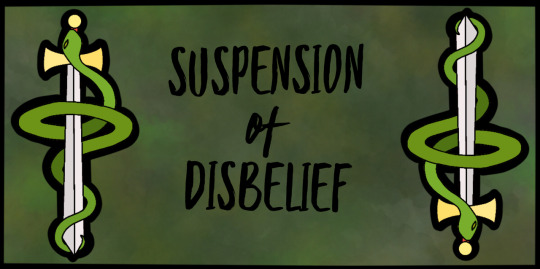

2018 Big Bang Fic Challenge Submission Amazing Artist, Big Bang Partner, and Header Creator: @ahoardofsides TW: Villainous Deceit, angst, manipulation, gaslighting, self-deprecation, self-harm, anxiety attack, violence, blood, attempted murder Pairings: Platonic LAMP WC: 2672
( Master | AO3 | 1 | Chapter 2: As You Like It | 3 | 4 | 5 | 6 | 7 | 8 | 9 )
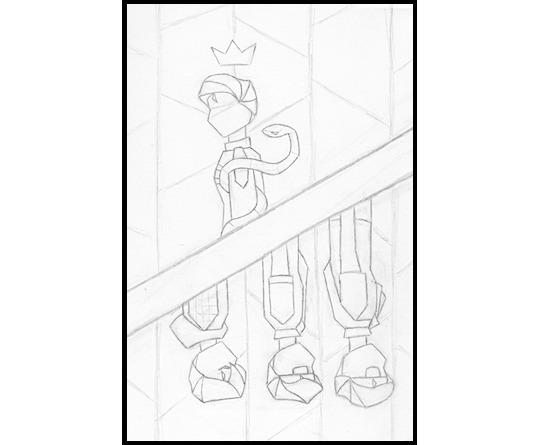
Roman reflected wryly that it was, perhaps, foolish to hope Deceit’s intrusion would be a one-time thing.
Sadly, it was not to be. Over the following days, Deceit continued to turn up, without warning, and apparently without any purpose other than to lurk over Roman’s shoulder and make sarcastic remarks.
Eventually, Roman started protesting Deceit’s presence less and less. He still insisted to himself that he didn’t trust Deceit at all! But he couldn’t ever manage to actually dispatch of the snake or expel him from his room, and at this point, it was getting to be more exhausting to try than to just deal with his continued presence.
Over time, he also protested Deceit’s backhanded compliments less as well. Roman told himself he was ignoring them, but there was also a small part of him that wished he could believe they were real.
At one point, Roman tried once more to half-heartedly question Deceit’s presence.
“I have a question for you,” Roman posed, eyeing Deceit who was draped across the foot of his bed on his back, legs hooked up over the footboard. “…Why do you insist on hanging around me like some overdressed leech??”
“I genuinely like you,” Deceit offered.
That was met with a flat glare.
Deceit rolled his eyes, but didn’t push it. “Fine. But I do prefer you over the others. I know, it’s so surprising,” he mocked. Roman still wore his distrusting expression; Deceit affected hurt. “We’ve done good work together!”
“We have never worked together! Unless you count your little workshop of horrors,” Roman sniped.
“No? Certainly not all of the acting Thomas has done,” Deceit pointed out, rolling over and sitting up. “All of the fantasies you’ve concocted for him?” From the tone of his voice Deceit actually seemed to regard those somewhat fondly.
Roman wasn’t quite able to answer that at first. He could hear his own words echoing in his head: never lie at all?? …And wasn’t it true? There was an inherent element of deception in theater.
Luckily, his own words were not the only ones that came to mind. “There’s an unspoken agreement between an audience and the show runners, that what they’re seeing isn’t actually happening,” Roman said, recalling Logan’s argument. He looked up to meet Deceit’s gaze. “They know it’s not real.”
“Oh yes, reality is such a wonderful place to be,” Deceit deadpanned. “You know, Roman— good acting, a good fantasy, is supposed to take you away from all that. They want to be deceived.”
“Suspension of disbelief— while, yes, a vital part of enjoying any fantasy, including the theater—” Roman stopped and shook his head, refocusing— “is not the same thing as deception.”
“Falsehood,” Deceit returned easily, making Roman startle.
Deceit pretended to adjust non-existent eye glasses. The obvious imitation was not lost on Roman, who drew himself up, offended once again. Deceit just smiled, too wide, and Roman grimaced, turning away.
“Yes, well, thank you for your input, tall, dark and creepy,” he muttered.
From behind him, Deceit asked, “Would it sound better this way?” But the cadence and tone weren’t Deceit’s— they were Logan’s.
Roman whirled, shocked to see the logical side looking at him with a half-smirk. Shock quickly melted into anger: “…How… dare.” His hand went to the hilt of his sword for the first time in a long time.
Deceit glanced at the weapon, then back at Roman, unimpressed. “Oh yes, you’re going to cut down a likeness of one of your friends.” Deceit rolled his eyes behind Logan’s glasses. “Freud would have a field day. Besides,” he calmly persisted, steepling his fingers. “Don’t you want Logan’s approval? Instead of just always turning down and arguing against your ideas?”
“You are not Logan.”
“That was certainly a direct answer to my question.” Deceit’s calm smile returned. “Well. If my input isn’t welcome, perhaps you should actually share your idea with the others, then?”
“Perhaps I will!” Fed up, Roman snatched the piece of parchment from his desk.
And, for the first time in two weeks, Roman marched out of his room, down the hallway, towards the living room, and…
And, the closer he got to the sides’ common area, the less confident Roman felt. His march became more of a stroll, then more of a creep, finally hesitating just before he rounded the corner.
Was he actually ready to share what he had with the others? Or had he just let Deceit goad him into this? Roman’s gut twisted; what if Deceit’s whole purpose was to get him to make a fool of himself in front of the other sides by showing them something terrible? His hand started to clench around the piece of parchment, crumpling it.
“Roman!”
The creative side nearly leapt out of his skin at the unexpected voice from behind him; he spun, finding Patton looking sheepish.
“Sorry, I didn’t mean to startle you! I was just excited to see you out of your room,” Patton explained. The little bit of guilt that started to gnaw at Roman’s insides got quickly squashed, as Patton went on to ask, “You got something there, kiddo?”
Realizing that Patton was pointing at the paper in his hand, Roman hastily stuffed it in his pocket. “…No.”
Without another word, Roman brushed past Patton, eyes firmly fixed on the floor, and swiftly returned to his room.
Roman didn’t even get thirty seconds of solitude before Deceit’s voice— Logan’s voice— began mocking him.
“You didn’t even attempt to show them, did you?”
Roman refused to look up, but steadily grew more and more tense.
“Would you like me to tell you what Logan would have said?” Deceit proceeded to gleefully tear into Roman’s work. “This is completely unrealistic. Utterly ridiculous. Where exactly do you think Thomas is going to be able to film a stunt like this?”
Logan’s— Deceit’s— voice dripped with disdain.
“He certainly won’t be able to afford it. And the time it would take to edit— please.”
Roman ducked his head, shoulders taut, fingernails digging into his palms.
“That’s not even starting on your weak dialogue— this pun, you’ve used it twice before. Honestly, the whole concept is just—”
The tension in Roman finally snapped. “If I’d wanted to hear this, I’d have just shown it to Logan!”
The room fell silent. Deceit pulled back, regarding the other side.
Roman turned away, flushing with heat and shame. He forced himself to sit back at his desk, pointedly avoiding looking at Deceit, even as he heard the quiet click of footsteps coming up behind his chair.
Then Deceit did something entirely unexpected. “…Well,” he offered, his voice now devoid of irony. “It does have some potential.”
Roman gaped.
“The blocking is good,” Deceit went on, continuing his assessment. “The physical humor you’ve come up with is actually funny. And this wordplay right here is very clever— especially with how you bring the joke back later in the video.” Deceit turned and eyed Roman, still wearing Logan’s appearance. Then he quirked one eyebrow. “Is that more in line with what you wanted to hear?”
Roman continued to stare, mouth hanging open, too taken aback to respond.
One morning a couple days later found Roman standing in awkward silence in the kitchen, waiting on a pot of coffee.
What made it awkward was the fact that he wasn’t the only one there.
Roman would really have preferred nothing more than to go back to his room, but he’d also been feeling guilty over his earlier interaction with Patton, and how he’d just walked off. Since then, he’d been making a concerted effort to try to be at least a little less obvious about avoiding everyone.
So, while the other sides milled about, preparing their breakfasts and making small talk, he stood quietly off to one side, his stare fixed on the coffee pot.
Roman still hadn’t told them about Deceit lurking around his room and taunting him; his creative block was humiliating enough on its own. But even Deceit’s visits had started to take on a new, disquieting trend— Deceit was now periodically taking on the forms of the other sides to offer his comments.
It irritated Roman, a fact that he never failed to voice, but what burned him more was that… there was a part of him that clung to each scrap of false praise. That indulged in imagining that it really was Logan or Patton or Virgil praising him, extolling his work. Especially considering how few positive interactions he’d had with the others lately.
It didn’t help that Roman still didn’t have anything to show for all the time he’d spent sequestered away in his room, which hadn’t escaped the others’ notice.
It wasn’t unusual for the anxious and creative sides to trade barbs, but all of Virgil’s seemed to be more pointed than usual lately. Logan had shown considerable restraint (for him), but was starting to get less subtle in his attempts to press Roman over his seeming lack of inspiration. Thomas had been putting off working on his next project because he couldn’t come up with anything, which left both his Anxiety and his Logic irritable.
Patton was doing an admirable job of keeping things civil between everyone. More than that, he could see that something was bothering Roman, and tried to reach out to him.
“Roman… We haven’t seen a whole lot of you lately,” he started, then paused. “You think you might be up to joining us for breakfast?”
Patton gave Roman an entreating look, and Roman had to look away; Patton was hard to resist. But Roman knew, it wasn’t just about breakfast. Patton wanted to talk to him, wanted to ask what was wrong, wanted to help.
Roman wasn’t quite willing to open up, though. Things were still uncomfortable and a little tense between the four of them— the argument of two weeks ago still wasn’t forgotten. “No thanks, Patton, I’m not hungry,” Roman answered quietly, and tried not to squirm when Patton’s face fell. Instead, he turned to the coffee pot, ready to pour himself a cup and leave.
“Of course not.”
Logan’s muttered comment made Roman halt; when Virgil snorted, his hand clenched around the handle until his knuckles were white. He took a moment to steel himself before he poured out his coffee, careful not to spill any, and replaced the pot.
Then Roman turned, a tight smile plastered onto his face. “Besides,” he said loudly, as though continuing on without interruption, and startling the other three sides. “I get the feeling that I’m not particularly wanted at this precise moment.” He glared pointedly at Virgil and Logan.
“What? No!” Patton protested.
Logan’s brow was also creased. “Excuse me?”
Roman scoffed. “Do you really think of me as that dumb, Logan? I’m not deaf.” That, they all reacted to— Logan pulled back, seemingly startled, but his expression quickly became stony.
“Whoa, guys,” Patton tried to intercede, before things got out of hand; the fragile peace that they’d been maintaining was threatening to crack.
“What is your damage, Princey?” Virgil demanded, eyes narrowed.
Patton shot him a frustrated look. “Virgil— not helping.”
Logan crossed his arms, continuing to regard Roman. “I’m quite aware that your hearing functions just fine,” he said. “In fact, it would seem that you have superhuman hearing, since you apparently possess the ability to hear things which I haven’t said.”
“I think,” Patton broke in, talking over all of them and physically putting himself between Roman and the others, “we all need to take a few minutes to cool ourselves on down.” On the surface, he seemed cheerfully calm, but his voice had a firm edge to it as he looked back and forth. “What do you say, kiddos?”
Logan wore a tight lipped expression, his eyes never leaving Roman. “Take all the time you need,” he said, voice clipped.
Roman’s fingers curled against his coffee cup again, his shoulders hunched defensively, while Patton shot Logan a warning look. Roman bit down on his tongue; he was not rising to Logan’s bait. With a forced effort, Roman made himself look down and take a slow slip of his coffee. It was bitter, and too hot to drink just yet, but he made himself swallow it anyways.
Virgil had no such restraint. “It’s not like that’s anything new,” he sniped, quirking one eyebrow.
Roman choked, his throat burning, while Patton whirled on the anxious side, looking aghast. “Virgil!”
Anger flared in in Roman’s chest; he slammed his mug to the counter, sloshing coffee over the sides. “Okay, listen up, you All-American Reject—”
“Would you guys please stop?!” Patton suddenly shouted, startling the rest of them into silence. “Can you two stop antagonizing him?” he demanded of Logan and Virgil, who both looked taken aback at his outburst. Then he spun to face the princely side. “And Roman, that was uncalled for—”
“I don’t need your lecture!” Roman snapped without thinking.
Patton reeled as though he’d been hit.
For a full four seconds, no one said anything.
Then, Virgil’s lip curled. “What the heck is wrong with you?” he spat, ready to meet Roman’s anger head on. Likewise, Logan’s expression had become cold and steely.
Patton hastily recomposed himself, and raised his hands placatingly, still trying to de-escalate the situation. “Guys, please, this isn’t worth fighting over—”
“Like hell it isn’t!”— “Language,” Patton chided half-heartedly— “He doesn’t get to treat you like that,” Virgil growled, ignoring the moral side’s admonishment.
“I find I must agree with Virgil,” Logan said, arms crossed and voice icy.
It wasn’t that Roman didn’t feel the guilt welling up in him; it wasn’t that he didn’t regret snapping at Patton the second the words had left his mouth. It was hard to focus on those emotions, though, when they were competing with indignant outrage. And with both Logan and Virgil lined up against him, when they were the ones who had provoked him in the first place— Roman had had enough.
Patton wore a pleading look, and he opened his mouth to entreat them all again; Roman cut him off. “Don’t bother, Patton,” he said, voice tight. “There’s an extremely simple way to resolve this.”
Then Roman spun on a heel, and stormed out, not stopping until he had reached his room and slammed the door behind him.
The creative side all but threw himself into his chair, snatching his pen from its inkwell. He practically attacked the paper, furiously trying to force a new idea to come forth.
Between writing and editing and rewriting, Roman ended up working straight through the night, trying to burn off stress. Somewhere in the early morning he became aware that he was, unsurprisingly, not alone. But for once it was easy to tune Deceit’s presence out and just be absorbed in what he was doing; also for once, Deceit remained almost entirely silent.
Finally, Roman forced himself to stop— straightening his back, wincing as it cracked and popped— and allowed that he might actually have something worthwhile.
At this point though, Roman didn’t know whether or not to trust himself. And so, still craving feedback and validation, he hesitantly asked, “…Deceit. What… do you think? Of this?”
Deceit arched one skeptical eyebrow at him. Roman continued to look uncertainly in his direction, not quite making eye contact. Deceit sauntered over and eyed Roman, before glancing at the piece of paper and offering: “Absolutely dreadful.”
Roman let out a sigh of disgust, rolling his eyes, but they came back to linger on what he’d created.
After a beat, though, Deceit leaned back over Roman’s shoulder, then pointed to a line. “…This would make more sense if it came from the other character.” This was followed by more seemingly straightforward comments on blocking and dialogue, tightening up this section here and moving that part there.
This time Roman masked his surprised, and after a few moments’ hesitation, picked up his pen again, considering Deceit’s words.
41 notes
·
View notes
Photo
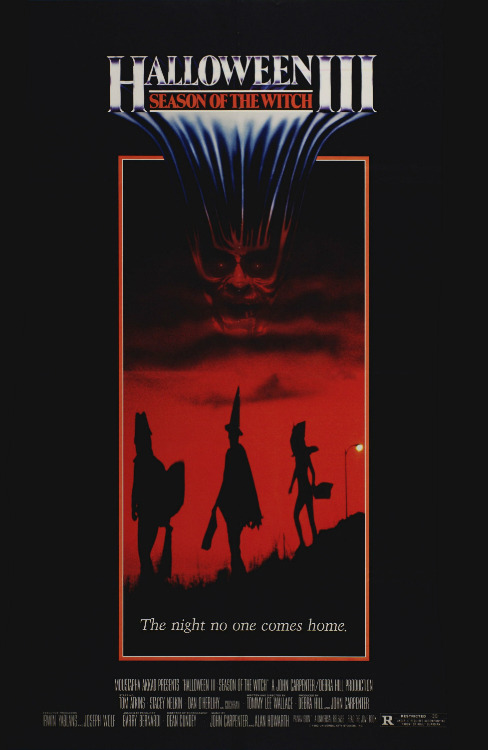
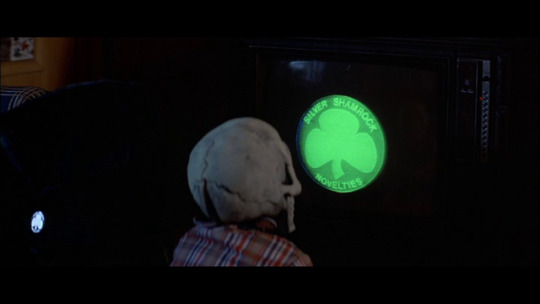
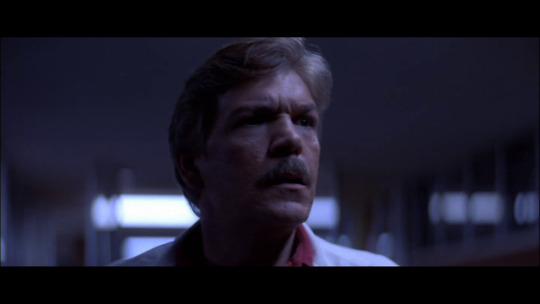
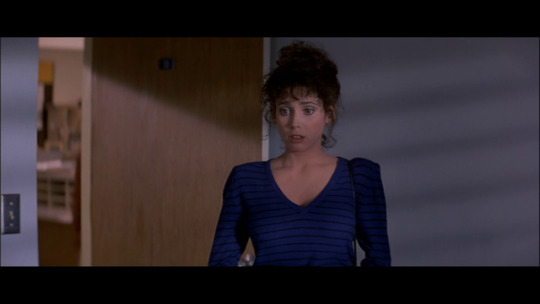
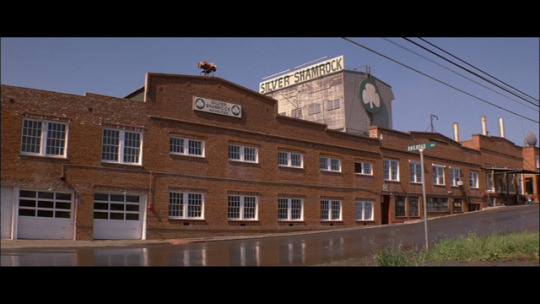
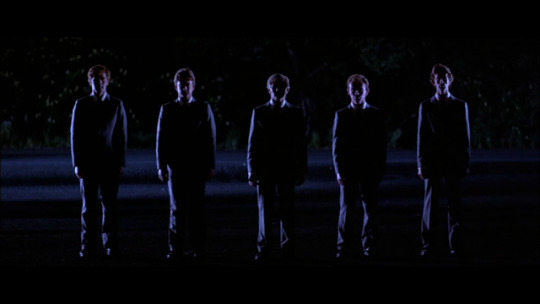
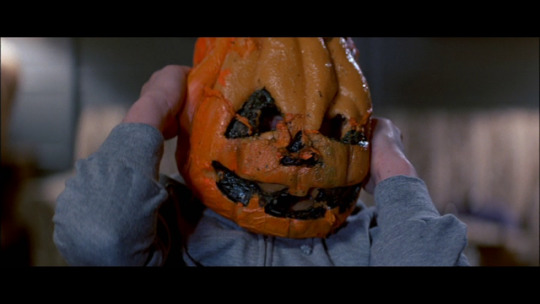
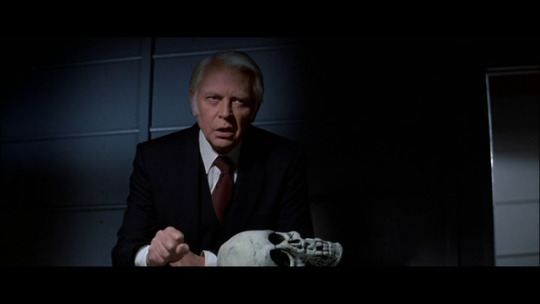
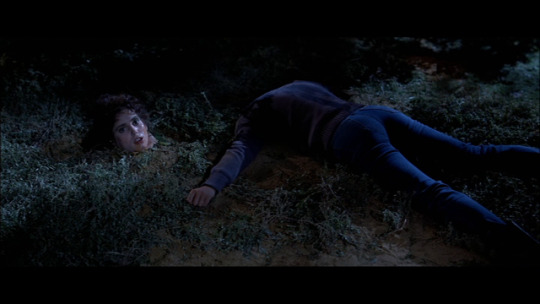
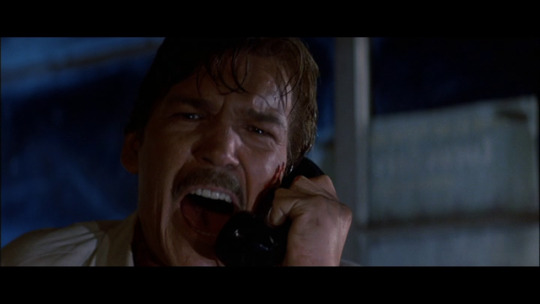
HALLOWEEN III: SEASON OF THE WITCH (1982)
When a man (Al Berry) clutching a Halloween mask is admitted to Dr. Challis (Tom Atkins)'s hospital, the man is soon killed by a mysterious stranger, who also kills himself shortly after. Meeting up with the victim's daughter Ellie (Stacey Nelkin), Challis decides to look into her father's death and find those responsible. Their search takes them to the headquarters of Silver Shamrock, a company currently selling a line of extremely popular Halloween masks. Challis and Ellie encounter a few other people, toy store owners who sell the masks in their stores, who have come to discuss their next shipments with Shamrock's president - Conal Cochran (Dan O'Herlihy). Ellie is soon kidnapped by Cochran's followers, which turn out to be robots. Capturing Challis as well, Cochran explains that he is a follower of the ancient ways of witchcraft and Halloween's original, darker origins, and is using ancient magicks to pull the ultimate prank - Sacrificing the children who have bought his masks, a sacrifice he demonstrates on the Kupfer family. Escaping his imprisonment, Challis rescues Ellie and the two use Cochran's own technology against him, killing him and burning Silver Shamrock to the ground. Unfortunately, the masks are still being worn by thousands of children and the commercial that activates their magic begins to play...
Halloween III: Season of the Witch is known by a lot of people as that Halloween movie. The unrelated one, the separate one, the one that has nothing to do with the saga of Michael Myers and Laurie Strode. Supposedly, the plan was to use Halloween III as a starting point to make the Halloween films a series of unrelated, anthology stories centered around the holiday. Unfortunately, with the original Halloween being an enormous hit and Halloween II only cementing the fact that the series was centered around the white-masked killer, Halloween III was doomed to failure no matter how good the film may or may not have been on its own. And how does it stand as its own film, a story of a believer in ancient magic using Halloween masks to slaughter children? Honestly, it has potential, but it's not perfect. It has a good premise and some genuinely creepy moments, but a lot of scenes are dedicated to Challis and Ellie simply sitting around and talking about how weird everything is. There are times where it almost doesn't even feel like a horror movie and comes across as more of a mystery/thriller type film.
The movie's most chilling sequence is easily when Cochran kills the Kupfer family, with Buddy Jr.'s mask apparently eating his head and releasing a torrent of snakes and insects to kill his parents. Unfortunately, while there are a few other gruesome kills throughout the movie (in fact, all the deaths in this film are surprisingly brutal, even for a horror movie), most of them don't really have the same unsettling supernatural feel as the Kupfer family's death, leaving the film without a lot of stand out horror sequences. Then there is the fact that Cochran's business suit minions are robots and his entire operation is so technology-heavy, with the masks even utilizing computer chips to activate their powers. Considering his plan is about dark magic and witchcraft and the ancient mystic power of Stonehenge, such a heavy emphasis on technology seems odd and out of place. Sure, a robot army can be creepy and all (the concept works perfectly in The Stepford Wives, among others), but why couldn't the henchmen simply be loyal followers of Cochran, or perhaps brainwashed by his power? Why do the masks need computer chips? Scrapings from Stonehenge (which has dark, supernatural properties) are already mixed into the latex, so why can't their death-dealing abilities simply be innate powers of the masks themselves? This doesn't ruin the film by any means, but it does succeed in making Cochran's scheme far more complicated than it needs to be.
Tom Atkins plays the heroic if not slightly sleazy Dr. Challis. A divorced man, he tries to be a good father for his kids but does not succeed, cancelling on them at the drop of a hat anytime something comes up. Though perhaps that isn't fair, as the film doesn't really give us a chance to become familiar with Challis and his family before we get thrust into the main plot. It's almost funny that he gets involved in Ellie's search for the truth so quickly and so heartily considering the police are still investigating her father's death and at the time he has no real reason to believe they won't solve it. Then, of course, there's his penchant for sleeping with a girl so young looking he actually has to ask her how old she is... After he's already had sex with her. This may have been an attempt by the movie to lampshade the age gap between Atkins and Stacey Nelkin, but it's not placed very well and either way it makes the hero a little more 'ew' than was no doubt intended. The aforementioned Nelkin plays Ellie - a pretty young woman looking for her father's killer - well enough, but sadly Ellie's fairly bland as a heroine. Being sad over her father's death is all we really get from her and she disappears for a good chunk of the movie once the final act begins. Once she's seemingly reunited with Challis, the twist that she's actually a robot is a good one, but it raises so many questions - Was she outright replaced by a robot duplicate? Was she turned into a robot? Was she a robot from the beginning (which could arguably be hinted at with "Aren't you just the least bit tired?" "No.")? If she was one of Cochran's robots, why did she help destroy Silver Shamrock, and why didn't she shut down once the control panel was destroyed like all the others? Such a huge twist might've worked better had it happened earlier in the film and was a little more clear as to exactly what the twist was. Irish actor Dan O'Herlihy brings us Conal Cochran, a good and very different villain from Michael Myers. Quiet and intense, he clearly finds joy in the idea of slaughtering untold numbers of innocent children. The scene where he monologues to Challis about the ancient ways of Halloween is captivating and one of the more memorable scenes. His death is a satisfying one, but the close up of his face turning into what looks like aluminum foil probably should've been cut and kept as simple as dying from the laser.
Thankfully, time has been kind to Halloween III. While it was panned upon initial release due to its lack of Michael Myers and overall connection to the first two films (aside from occasionally showing the original Halloween playing on TV...), people have since come to enjoy the film on its own merits. While not the most amazing horror movie, it does deserve this newfound love. The scares, while not plentiful, are effective; the special effects are done well and quite unsettling, and the Silver Shamrock commercial jingle is a tune that will never leave your head after you hear it. While Michael Myers has come back plenty of times, Conal Cochran and his malicious masks have yet to enjoy a revival of their own.
Rating: ★★★ ½
Cast: Tom Atkins ... Dr. Daniel Challis Stacey Nelkin ... Ellie Grimbridge Dan O'Herlihy ... Conal Cochran Ralph Strait ... Buddy Kupfer Jadeen Barbor ... Betty Kupfer Brad Schacter ... Little Buddy Garn Stephens ... Marge Guttman Michael Currie ... Mr. Rafferty Wendy Wessberg ... Teddy Al Berry ... Harry Grimbridge Essex Smith ... Walter Jones Nancy Kyes ... Linda Challis
Director: Tommy Lee Wallace. Prodicer: Barry Bernardi (associate producer), John Carpenter, Debra Hill, Joseph Wolf (executive producer), Irwin Yablans (executive producer), Moustapha Akkad (executive producer, uncredited), and Dino De Laurentiis (executive producer, uncredited). Writer: Tommy Lee Wallace, John Carpenter (uncredited), and Nigel Kneale (uncredited). Music: John Carpenter and Alan Howarth. Special Effects: William Aldridge (assistant), Jon G. Belyeu, Thomas R. Burman (special makeup), John Logan (special makeup effects artist, uncredited), and Don Post (Halloween mask creator).
#halloween iii season of the witch#silver shamrock#halloween#john carpenter#horror#tom atkins#conspiracies#holidays#robots#1980s
3 notes
·
View notes
Text
Call of Cthulhu: an over long analysis
In trying to give any video game a fair review, one faces difficulties, because games try to be and to do such a varying range of things. I think this is especially true of Cyanide’s Call of Cthulhu. There are so many metrics by which one could measure the game. Is it engaging? Is it scary? Does it do what it does well;? Is it well made? Is it true to its Lovecraft source material? Is it true to its roleplaying game source material? Is it worth the price? If you are short of time, and I would not blame you if you were, then very quickly: yes; no; yes; depends what you mean but no; sort of; yeah and that depends but probably not. If you are not short on time, then let me explain myself (in very great detail) by taking these points in turn. It is difficult to appraise the game without spoilers, but I will warn you when they are coming. If you do not want them, skip to the next heading.
Is Call of Cthulhu engaging?
Yes. Not the most engaging game, mind, but its story, characters and general sense of intrigue carry the game. There are technical problems with the writing that I will deal with below, but those are the video game equivalents of bad grammar and spelling errors (of which, while we are on the subject, I noticed a bit in the subtitles and item descriptions). Despite the animation problems, also mentioned below, the characters are well fleshed out both through direct speech and context. The graphics are nothing sensational, but are definitely good enough to create a world you want to explore. One of my favourite things, though, is that the game does not treat you like an idiot, nor does it leave you behind. My problem with the few investigation-based games I have played before is that they are determined to leave no man behind, so they bash you around the head with everything that they have lying around. Call of Cthulhu does not do this. Cut-scenes and mandatory conversations make sure you know what is going on even if you are not paying attention to anything else that is around you, but if you are looking at the details in the world, even the ones that are not in any way highlighted by the big buttons that appear over everything that you can interact with, then you can start to piece together why things are happening, as opposed to just finding out that they are happening. Intelligence, time and exploration are rewarded with details, but none are essential for understanding the gist of the story. It is difficult to say much more without spoilers, so here are some SPOILERS:
While Officer Bradley was clearly the best character, standing out from most modern video game characters you see today by being wonderfully human, but not in a broken, flawed way, I want to prove my point about good characters by pointing to Charles Hawkins. While this character is never explicitly explained, we know he has been in on everything since the beginning. He is literally a wife-beating monster and definitely a villain of the piece. But he is also conflicted and caring. He genuinely wants what is best for Sarah, even if that means abusing her. He is a bad, angry man, but he is trying to do right. And the beauty is that the game never actually tells you this. It shows you. No one really ever says anything about Charles’s character, but reading into what he says and watching what he does really gives you a feel for his character. Which is impressive for a character with such little screen time.
Is Call of Cthulhu scary?
No. I do not play horror games so I am not the person to ask really. Or maybe I am the perfect person to ask. Either way, for what it is worth, I was not scared by this game. I hate being chased and a couple of sequences made me tense up in my chair, but I would not take that as a massive indication of anything. The same fear of being chased is what made me stop playing Mirror’s Edge and that game is very far from scary. In the game’s defense, however, jump scares are cheap and I hate them and this game seems to aswell. I counted exactly two and one of them was mostly just a creepy musical trill and the other one was so obviously coming it did not even startle me. So Kudos there.
Does Call of Cthulhu do what it does well?
Yes. What I mean by this is, if you boil the game down to what it actually is, it does that well. What that means, is that it is a very good walking simulator. If that is not what you want, do not play this game. This is a walking sim with some very light RPG elements and a few sections where, undoubtedly, someone higher up the chain came in and said “we need a stealth section!” or “we need a combat section!” or “we need a horror section!” or “we need an action section!” and the developers obliged, put in one instance of each and moved on. These sections, except maybe the fun but very basic stealth section, are by far the weakest parts of the game (oh my, that combat section!). The exceptions are the many puzzles, which, like the plot in general, do not treat you like an idiot. Except for one part of one, which honestly feels like the developers made a mistake (what is supposed to be the clue for where to look for the answer instead just straight up gives you the answer, despite the fact that all the stuff for actually reasoning out the answer is right there in the game!).
I only have one problem with the walking simulator nature of the game. There are a few sections which are clearly only there to pad out time. Most of the game is a pretty tight linear tour through the story, but occasionally you are given an adventure game style ‘puzzle’ that just boils down to, “walk around this area you have already walked around for ages until you find the thing that you have to poke to make the story progress”. Anyone who has played the game will know what I mean by ‘the bust bit’. And there is another section which might work as a horror piece, maybe, but just seemed to me to be “run around this same small area 5 or 6 times till we arbitrarily let you out”. ‘Lamps’ is the clue word for that one, if you’re curious as to what I mean. But these are nit-picks. Generally the game is an excellent walking simulator.
Is Call of Cthulhu well made?
That depends on what you mean. Games are hugely multifaceted, but what often differentiates a good game from a poor one is the ability of its developers to work to its strengths. It would be an unfair criticism of Indie darling Limbo to say that it had bad facial animations. It definitely did, but this is not a problem because the characters effectively have no faces. This seems like a facile point, but I think it is important to remember that Cyanide, the developers of Call of Cthulhu, have previously been known for the Styx games, a few Games Workshop titles, a buttload of cycling games and little else. Call of Cthulhu is not triple-A, but it’s not Indie either. The game, at least visually and narratively though, tries to do everything a triple-A title would attempt to do, as opposed to the usual Indie approach of making at least one aspect in some way minimalist. This is not an excuse, merely something to keep in mind as I say that the animation is some of the worst I have seen in games for a very long time. It’s not quite as funny as Mass Effect Andromeda’s, there is not quite enough going on for it to be quite as bizarrely broken. Dialogue lines would come out of characters whose mouths were shut, arms would constantly drift around like they had slightly confused minds of their own and I hope the ‘facial expressions’ were enjoying their trip to the uncanny valley.
The writing was a bit all over the place as well. Writing, mind, not story or character construction. There is a reasonable amount of choice in the game, but an annoyingly large number of the lines of dialogue do not seem to match up with the choices you make. In the first main scene, you can go straight into a conversation with someone and mention in one conversation branch that you know that a character is a big deal on Darkwater island, and then immediately choose another conversation option where you reveal you have never even heard of Darkwater island before. In a subsequent scene, a man told me he would meet me somewhere later, but then, when I got there, my character had several lines questioning why the man was there. There are numerous moments like this and it really takes you out of the experience every time it happens. A similar issue is present whenever you enter an enclosed space and your vision starts distorting. I only knew that this was a representation of the main character’s claustrophobia because the developers mentioned it in press releases. I did not notice any mention of it in the actual game.
A bit more nit-picky, but there are a few times when the game simply does not tell you something that would be useful to know. The most egregious of these is when they give you something which has limited uses but do not tell you either that it has limited uses or how many uses are left until you have used them all up. It is never a particularly large problem, but it would have been nice to know.
Still, looking at the game as a technical work, I must say that the graphics are nice. The art style has a Dishonored feel to it, which I personally have lots of time for. It is not quite as stylised, but the game is generally very pretty, which is a good thing too since you will spend a lot of time shoving your camera into every corner of it.
Is Call of Cthulhu true to its Lovecraftian source material?
Ah, the fun question. The answer really depends on how much of a deep dive you want to do. But before I jump in, it is important to note that the developers explicitly said their game was based on the table-top RPG, rather than Lovecraft’s stories. What follows, then, is a piece of literary critique (read: w**k) and not necessarily a criticism of the game. It will also be absolutely riddled with SPOILERS:
Call of Cthulhu gets a lot right about the common conception of the Lovecraftian aesthetic: the green tinge that permeates everything gives it a distinctly Cthulhu-y vibe, the rural town is a common motif of Lovecraft’s (the game is very Shadow Over Insmouth here) and Cthulhu as an entity is almost used well. As I said at the top, SPOILERS! Cthulhu actually shows up, for about one second, in one of the game’s four endings and is presented as an unstoppable, maddening, world-ending force. This is doing Cthulhu right. There is no fighting Cthulhu: once he has been awoken from his fhtagn, the world will crumble around him. The only hope one has is to prevent that from happening, so it is appropriate that, if it is allowed to happen, the game gives you no chance to resist. The game also takes a good approach to sanity and curiosity. Fuller is the character who most explores the concept of curiosity and it is shown to warp and twist him as it opens his mind to new possibilities. This fear of curiosity is at the heart of Lovecraft’s writings. The game also plays with sanity, another of Lovecraft’s main themes, although most of the mechanical implications of that are better discussed in relation to the Call of Cthulhu table-top RPG.
However, there is one thing that the game gets seriously wrong about Lovecraft. In those moments when the game is scary, the story itself is not one of cosmic horror. Much horror is about holding a mirror up to humanity. It is about showing and exploring our darker sides. Werewolves explore our animal nature, vampires (at least traditionally) were an exploration of sexuality, serial killers explore human psychopathy, zombies represent rampant consumerism. The monster, at the end of the day, is us. This is not the goal of cosmic horror. Lovecraft is not writing stories about people. His horror is metaphysical. “The most merciful thing in the world, I think, is the inability of the human mind to correlate all of its contents” is how he begins his story The Call of Cthulhu and this one sentence, I think, underpins all of his work. His protagonists go mad not because they saw something scary, they go mad because they saw something they cannot explain. Their very understanding of reality is thrown out of whack and they are shown that the safe, pedestrian, societal lives they thought they were living were facades: the ignorance that our subconscious chooses for us to protect us from realisations about the universe and our tiny, utterly insignificant part in it. His entities are often not even evil, they are simply so alien and disinterested that we matter as much to them as ants matter to us. This is why Lovecraft was so revolutionary, he moved away from the traditionally biblical kind of horror where the monsters are manifestations of our own sins and turned instead to the secular world of science for his horrors. “The sciences, each straining in its own direction, have hitherto harmed us little”, he continues in Call of Cthulhu, “but someday the piecing together of previously disassociated knowledge will open up such terrifying vistas of reality, and our frightful position therein, that we shall either go mad from the revelation or flee from the light into the peace and safety of a new dark age”. I say again, Lovecraft is not telling stories about people. He is telling stories about the universe and our inability to understand or cope with it. The truth that science will one day unlock, Lovecraft seems to be suggesting, is that we do not matter at all. This is cosmic horror. But Call of Cthulhu (the video game, that is) seems to miss this. Pierce’s sanity (or insanity) progression comes the closest. I say more on this mechanic below, but the final choice that Pierce must make is the most Lovecraftian moment of the game.
There are four endings to the game, one default and three others unlocked through story actions, which is a system I like. On a very quick side note, I also really like how there is a save point just before the end, allowing you to go back instantly and replay the endings you did not choose, but only if you unlocked them (I unlocked three of the four endings on my first play-through). Suicide and accepting the ritual both present “go mad from the revelation” endings, each with a different but totally appropriate flavour of madness, while the ‘it’s over’ ending represents a flight back into a dark age, Pierce sticking fingers in his ears and yelling “la la la it’s all a dream!” I also like here that you have to unlock all but the ritual ending. I was annoyed with this ending until I found this out. The game does not really give you any reason to complete the ritual. The Leviathan and the cult have all clearly been bad the whole way through the game, there is not ever any good reason for Pierce to surrender at the last moment and perform the ritual. Having it as the default, though, makes this lack of motivation slightly more excusable, as it represents Pierce simply surrendering to what he has been told is his destiny, as opposed to having worked for the will to fight back in some way. The fourth ending, the counter ritual, is by far the poorest, which is a shame because it could so easily have been fixed. You know that Drake is planning something, but Pierce, or at least my Pierce, was never told exactly what that was. My Pierce would not logically even have known that there was a counter ritual, never mind how to do it and certainly never mind what it actually does (a point that I am still completely in the dark about). This is something, as far as I can tell, that the game never explains, even if you do choose this option. Just a little bit of exposition, probably delivered by Drake, would have cleared this all up.
But I digress. Call of Cthulhu is essentially a game about people. It is about a group of people who are more or less tricked by some powerful alien being into doing its bidding. And as I said above, it does this well. But in being about people and their struggles, it fails to focus on what Lovecraft himself actually focuses on. Now, a quick disclaimer: I do not know for a fact that Lovecraft was a racist and viewed minorities as ‘less human’ than white people (although there is evidence for this in his work), but I am going to assume this is the case, at least in some way, for what I am going to say. I think it is telling that most of the cultists in Lovecraft’s work are minorities, because this distances even his human villains from the (I think) exclusively white protagonists of his stories. This separation between the human and the alien is completely ignored in the sequences in which Pierce is visited by the Leviathan in prison. The fact that the Leviathan would take humanoid form and use human manipulation tactics to get Pierce to do what it wants is totally non-Lovecraftian. Where is the horror at our utter inconsequentiality here? Cthulhu is scary because it does not care about us, we matter so little there would be zero point in it or any of its ... associates (for want of a better word) attempting to use tactics to manipulate human kind. In The Call of Cthullhu (the story now, not the game), Cthullhu pretty much tells people to come and they just do. No need to take human form, no need to use psychological methods. Lovecraftian horrors use us like the dumb insects that, compared to them, we are.
Further the visions that haunt Pierce are visions of people, mostly, and the awful things that they do to each other. He questions his senses, but he never really questions his position in the universe or what it would actually mean if all the things that he is seeing were true. Lovecraft’s protagonists usually do believe what they see and this is what drives them mad, while Pierce is driven mad by questions about whether or not to believe what he sees. The biggest crime though, the moment that really made me feel that the developers had missed the point, is in the after-credits half of the ritual ending. Here we see the cultists all engaged in a murderous brawl, screaming with delirious madness as they punch and kick and bite each other while, presumably, Cthulhu gets on with the important job of destroying the world just off camera. But this is the wrong kind of madness. Sure, everyone would go mad as their understanding of reality snapped at the vastness and alien-ness (alienitude? alienosity?) of Cthulhu, but for all of them to just go kill-crazy? It doesn’t make sense. That does not seem to be the madness that comes of having your entire knowledge of reality shattered. It feels more like a madness that makes a flashy ending to a video game.
Is Call of Cthulhu true to its roleplaying game source material?
Yes, broadly. Firstly, I am not a CoC (which is what I’ll call the rolepaying Call of Cthulhu, because this is getting stupidly confusing) expert. I have played and run a few games, but it is not my main game. That being said, I think I know enough to say that Call of Cthulhu does a good job of translating CoC into a video game. Its plot is a little more big-leagues (bigly) and showy than your average CoC game, but that is fine. It’s the same thing that happens when a film is made from a TV series. And in this regard, Call of Cthulhu is hardly a huge offender. This might just be me, but I really like stories that know how to reign in their scale and Call of Cthulhu does a pretty good job of this. With the exception of one particular sub-plot (which is by no means overblown just a little elbowed in (the whole painting sub arc, btw)), everything is pretty well contained and not much is thrown in to escalate things to stupid levels as the game progresses.
Call of Cthulhu continues the well-practiced trend of CoC games of being incredibly linear, but while this is an actual problem for roleplaying games, where the only limitation is imagination, in a video game, which is fenced in by budget and deadline constraints, this linearity is not so much of a problem.
An area where Call of Cthulhu differs from CoC is in its use of skills. The skill list for 6th edition CoC (which is the edition I know, so don’t pester me about 7th ed) is over 50 skills long. Call of Cthulhu, on the other hand, has 7 skills. This means you never have those horrible moments where you absolutely NEED a successful library-use roll or else-you-will-all die-in-the-next-encounter-because-you-did-not-know-the-monster-is-weak-to-salt-but-you-put-all-your-points-into-Fast-Talk-so-I-guess-you-are-all-just-going-to-die-and-no-I-am-not-still-bitter. This, I feel, is an improvement. It could be argued that it reduces the scope for roleplaying, but with the limited conversation options and the actually quite well written and characterised Pierce, you are never going to be totally in control anyway. Call of Cthulhu is also paced very much like a CoC game as well, with slow, social information gathering at the beginning, ramping up to more action/horror moments later. This does make some of the skills more useless later on in the game, but this is not a major problem and a difficult one to avoid (and certainly one that CoC games usually fail to avoid). Also like CoC, there is, I think, a clearly right thing to do at character creation, but while in CoC it is because some skills (I’m looking at you, operate heavy machinery) are simply pointless, in Call of Cthulhu character gen is the only time you can use experience points to level up Occultism and Medicine, something you are definitely going to want to do and something the game does not do a good job of telling you.
CoC’s main selling point, as a system, is its sanity mechanic, something that Cyanide obviously spent a great deal of time looking at when making Call of Cthulhu. I have heard that some people did not think it was used well, but I have to disagree. Sadly though, to explain why I have to make liberal use of SPOILERS!
In CoC, sanity is effectively your character’s long-term health bar. Your sanity level sticks around from adventure to adventure with very little you can do to raise it if it falls. It is, in many ways, your character’s expiration date. It goes down whenever you see something Cthulhoid, but there is a random element to it. Clearly, this would not work for Call of Cthulhu, not in the same way anyway. If Call of Cthulhu were a CoC game, it would take at most three or four sessions, and that is not really fast enough for a character to melt completely into a gibbering puddle of insanity. So Call of Cthulhu does something very different and I think it does it very well.
At the beginning of the game, you have some control over your sanity being reduced. The most clear example of this is when you have the option of whether or not to read the Malleus Monstorum. But as the game continues, you have less and less choice over whether you get to see sanity-breaking stuff or not. It basically just happens to you. This means that really, your loss of sanity is almost 100% controlled by the game’s story. Therefore the moment that you break mechanically is also the moment that weird stuff starts happening, by necessity, in the story. Pierce starts to have visions, some of them obviously fake, some of them much more plausibly real, and because his sanity has broken we know that we are in a situation where we should be questioning everything, as opposed to earlier in the game when the lines were much more clear cut. This is a co-opting of mechanics by story, which I have not really seen before in a game. The game gives you something that appears to be in your control but then slowly and subtly takes it back. You could see this as a reduction in player autonomy, because it really is, but I think this fits very well with the themes of destiny and inevitability in the story. It also produces an organic way to show the deteriorating mental state of Pierce without it being exposition-y. If we had felt, right from the beginning, that the sanity bar had nothing to do with our own choices, the moment when Pierce breaks would have felt contrived. But by giving us that illusion of choice we are engaged with the progression of that sanity bar in a way that we would not be otherwise and when it finally shifts from stable to psychotic, we do not see this as a simple narrative move, we see this as an organic part of the story and the choices we made in it, even if really it is not. I also love how the sanity manifests itself. It is subtly done and I think interesting debates could be had about what is real and what is not (I have strong feelings about when the last time we really see Colden is, for example). A brilliant example of this is how we shoot Fuller in what is obviously a dream-scape and then come back to what we think is reality and find we have shot him there too. But this, itself, is also shown to be an illusion when, in one of the ending sequences, we hear him talking to a nurse. It is all very Inception-y and I really like it. It was a nice subversion of expectations, as I was expecting the sanity meter, as a player influenced mechanic, to be able to affect only aesthetic things and maybe minor story elements. I noticed this exactly once (a painting had blood spatters on it which disappeared when I approached), but the way the game takes control of the mechanic and allows it to have serious narrative impact, while a removal of player autonomy, was very refreshing.
Is Call of Cthulhu worth the price?
At time of writing, Call of Cthulhu is selling for £40. It is not worth that. You can go and pick up Divinity Original Sin 2, a game that is basically empirically perfect, for £10 less than that and get at the very least ten times as much play time out of it. Where the price point of Call of Cthulhu should be for you is something only you can decide. £15 seems like a more reasonable price point to me. What I look for is usually a strong enjoyment/hour ratio as opposed to a good hour/money ratio, and Call of Cthulhu has a very good enjoyment/hour ratio, but this is certainly helped by its short length. At the end of the day, I would say that whatever you would be willing to pay for two engaging, thoughtful, just below Hollywood tier films is probably the right price for Call of Cthulhu. Especially since the game has basically no replay value. In many ways it is very average, but if you have a thing for walking simulators or Lovecraftian worlds, then this game is a must buy for you. But maybe wait until the price has dropped.
#Call of Cthulhu#Cthulhu#Lovecraft#Game Review#Essay#Cosmic horror#Literary analysis#Roleplay#HashtagsHaveNoSpaces
2 notes
·
View notes
Text
Okay, let me just rant about this once-great show I used to love...
Supernatural started out 13(!!!) years ago as a cool, well-written, dark, stylish show with creepy villains, interesting plots, lovable characters and damn good special effects. From the pilot episode, I was hooked. I’ve never missed an episode, even though my enthusiasm for the show has waned in recent years.
But after the most recent episode, the 13th season finale, I was struck by just how... TERRIBLE this show has become.
This past season as a whole has been extremely dull compared to previous years, with no real drive behind the story line, but I slogged through it to this last episode to see if they could at least turn things around and end on a high note...
NOPE. I actually found myself wincing at the awfulness of this season finale.
Some standout moments: the guy in the store being tossed around by Jack's supernatural power takes the time to slowly remove his earphones? I laughed. Sam prays for Jack to appear and then, seconds later, when Jack arrives, he's like "Jack???" in a breathless, surprised way? I cringed. The air-fight between Michael and Lucifer? Worst combination of acting, choreography and special effects I have seen in years. And don’t even get me started on the cheesy freeze-frame of Dean's glowing eyes at the end which was lifted straight out of an 80's horror movie.
Also, the angels / archangels are just NOT interesting anymore, and yet we’ve had them jammed down our throats season after season. Lucifer (the actual devil) is not even a threatening presence on this show. He’s written and played in such an annoyingly smug and trite way that he has no impact anymore. I really hope that this time, he’s gone for good. Which brings me to one of the show’s most profound problems: the unending resurrections of supposedly dead characters. It’s lazy writing and pure fan service. This season alone has seen the return of Castiel, Gabriel, Rowena, Bobby, Charlie and Ketch. Death has lost all meaning on this show. When the stakes are this low, nobody cares. I can’t get invested in a character’s fate when I know that if they die, they’re just going to be brought back several episodes later. 13 years down the line, the show is just really chasing its tail, rehashing old plotlines and character arcs with no real surprises or dramatic tension anymore.
Also, I’m really fond of Jared Padalecki and Jensen Ackles, but even their leading characters of Sam and Dean Winchester have become so tired and uninteresting. The dynamic between the brothers used to be so compelling, and was really the main selling point of the show, but there’s been no significant character development in years. They’ve become stale. When you’re playing the same characters for 13 years, things have to change and evolve to keep it exciting and these guys have just become a little too familiar. I know they’re probably sticking around on this show because they have fun working together and have settled into a workplace that they enjoy, but the truth is, if this show had ended years ago, these two actors could have had vastly more interesting careers in film and television, playing a variety of characters, instead of going through the motions of playing Sam and Dean Winchester year after year.
When I was done watching this season finale, I got really sad thinking about all the ways in which Supernatural has gone downhill since its heyday, because I had a genuine love for it. I actually wish it had ended several seasons ago and gone out on a high, because the quality is so noticeably diminished these days. The writing is bland and predictable, performances are mediocre, and special effects look cheap. There aren’t enough monster-of-the-week episodes anymore, with scary and original creatures for the boys to vanquish. There are no interesting Big-Bads to defeat, except the ones recycled from earlier seasons. There are no gripping plot twists or genuinely heart-breaking moments. There have been no romantic subplots in years because the show’s female fanbase gets jealous any time the male characters look at a woman. And let’s not even get into the issue of queer-baiting, which the show has been guilty of in seasons past.
Overall, plot- and character-wise, things are played very safe on Supernatural these days. The boat is never rocked too hard. For fear of alienating longtime fans, the show seems to pander to viewers who have stuck around too long, have seen it all before, and now expect a certain rinse-and-repeat formula, which stops the show from making much of an impact anymore. There have been so many missed opportunities to mix things up. It’s disappointing.
Nonetheless, I’ll admit I’ve found it tough to tear myself away from this show completely. I mostly watch out of nostalgia, for my love of the early seasons and because of the likability of the lead actors. But I’m keeping my fingers crossed that season 14 will be announced as the last. If so, I may just stick around to see how things end for the Winchesters. If not, it may be time to jump out of the Impala before it sputters across the (long-overdue) finish line.
#supernatural#spn#spn spoilers#spn season 13#spn 13x23#anti supernatural#anti spn#text post#long post
20 notes
·
View notes